#in terms of themes and characters and character arcs and what not
Explore tagged Tumblr posts
Text
Remember when we thought JJK was gonna spark a new era of (*cough* revolutionize *cough*) shounen anime/manga?
I wish to go back to those times.
#in terms of themes and characters and character arcs and what not#revolutionize might be a strong word#but whatever#like amazing#a masterpiece#only to like not matter???#which I get! writing is hard!#or at least it’s hard for me it isn’t supposed to be hard for the people I look up to :/#this is not a hate post#this me trying to be friends with my sadness 🎶#jujutsu kaisen#jjk#gege akutami#Gege fumbled the ball#that might have been a little hateful#gojo satoru#geto suguru#itadori yuuji#megumi fushiguro#nobara kugisaki#maki zenin#okkotsu yuuta#inumaki toge#panda#satosugu#itafushi#nobamaki#congrats to the folks who were haters from day1#you’re the real winners here
75 notes
·
View notes
Text
It's looking like there's a growing divide between Campaign watchers and Tlovm watchers in terms of like. We're here for the characters. 12-episode seasons aren't. They can't be. I'm already making peace with everything we'll lose in the Mighty Nein show, and I know I will enjoy it for what it is but I also know that almost nothing that made the story so special will translate to the screen, because turning it into a show automatically means (in this day and age) that plot must be the number one priority. They've already come out and told us it's going to be different, the characters we know and love but new stories.
Because that's how this has to work. And I feel bad for campaign one lovers, because while it is certainly the easier of the two to translate to a big, overarching story, even though it's a more "traditional" high fantasy story with easier archetypal characters, the archetypes and the plot aren't what cemented most people's love for the campaign. So much of the love for critical role is stored in the interpersonal dynamics and the payoff that comes from hundreds of hours of tiny interactions that one day become cornerstones of development and even affect or dictate the plot.
There's no room for that. There's no room for Bard's Lament in a story that cannot afford to remove and replace a main character. A lot of tlovm is for people who have been here for all of campaign one. Most of it, however, isn't. It's for a new crowd. While CR may have creative control, you can bet your ass that there were months and years devoted to figuring out how to map a character-focused love of the show into a plot that hits the right beats to be viable in the show market.
And it worked. Tlovm has consistently high viewing numbers, and its popularity has brought and will continue to bring new people into the universe who have never interacted with CR previously. That's not a bad thing - imagine finishing your favorite show and discovering it has another FIVE HUNDRED HOURS of the equivalent of behind the scenes content. That's incredible for these newcomers. But man, it is in many ways a loss for us.
#Tlovm spoilers#In some ways it's like looking into a dark mirror#And this is again with a story that's relatively easy to plot with clear arcs and themes#The mighty Nein was a sandbox that was entirely character driven in terms of where they went and what they did#It has a few loose arcs but even the fact that molly died so early#The fact that he haunts the remainder of the show#That's going to be lost. Its impact on Yasha and on beau who spends the rest of the campaign looking for a chance to do what he did#The fact that his death tied narratively into Caleb getting the spell for their hut - their home - and nearly crying#Knowing he had a way to keep them safe after they lost one#None of that is plottable#I'm losing my thread of thought and I have to work but. I don't even know if sad is the right word#Because CR has gotten so far. So much further than anything of its kind.#There is much joy here and I will adore seeing the Nein#But it's okay to acknowledge that capitalism strips away the ability to focus on the heart of critical role#And that's why the live play media is so special#That's literally what makes it special and what makes the story so impactful#Critical role
175 notes
·
View notes
Text
Something I think about all the time is how some of Aaravos’s first words to Viren were “how may I serve you?” and one of his absolute last direct remarks made on his thoughts on Viren (for now) is “I tried so hard to help your father”.


#the dragon prince#tdp#viravos#aaravos#viren#lord viren#tdp aaravos#aaravos tdp#tdp viren#viren tdp#the themes of control and power and freedom go so hard within their relationship#especially considering the self-sacrifice boarding onto sh themes with them#that also tie into the butterfly motifs in the show#which also somehow tie into their individual relationships with their literal butterfly child#(which is something I'm not gonna shut up about btw how the butterfly is one of the most commonly associated symbols for the psyche)#I mean their child being created as a tool to serve them that supposedly wasn’t meant to have a soul#and viren and aaravos both in a similar way as their child dealt with the idea of servitude in their arcs a lot#but ultimately the ways we saw them adhere to the idea of servitude was to either actually indirectly serve their own means#or to alternatively further self-deprecate themselves#like just to callback to how aaravos refers to viren and later on to himself as vessels#like I think the fact that they added that second use of the term wasn’t for no point at all#I think it was to show how little aaravos respects his own bodily autonomy as much as viren’s or the next guy’s#or yk his own child#but anyways yeah it is so fascinating to see two characters who are so power hungry be willing to damage themselves in such awful ways#or in other words sacrifice so much and even themselves#just to obtain that sense of power#especially in relationship to each other#the irony with these two#but ig that's what aaravos was preaching about with everything being complicated
16 notes
·
View notes
Text
…people are mad that Percy didn’t befriend a titan that tried to kill him? Why would he even want to? They are not friends, Percy just said they were so a huge ass titan wouldn’t feel compelled to start attacking them again, kinda like no worries all good and safe here.
Bob wasn’t worthy of that friendship until he tried to help him, at that point Percy was so overcome with guilt for lying to him about being friends he confessed everything and accepted death as punishment for being a bad friend. He didn’t get mad at bob, blame him for needing to be dunked in the Lethe in the first place (you know since he was trying to kill him, Nico, and Thalia, which makes him completely at fault for losing his memory), didn’t defend himself in any way just asked that bob save Annabeth at the very least?
As I understand it bob didn’t hold it against him for long? He did come back and save him and Annabeth, and even sacrificed himself so they could get out. Overall, became a better version of himself, but like before all that, why would Percy go back and talk to him??
#remember back in the pjo days when everyone had son many interesting takes that didn’t necessarily center around right and wrong just#compelling themes and characterization that enriched the story#and didn’t unanimously decide to hate on a well rounded character based off one interaction that doesn’t even negate any of that characters#good qualities?#the mental gymnastics this generation of fans want to do to prove what a shit character Percy is because of his rocky relationship with Nico#y’all realize Percy played a huge part in making Nico who he is unwittingly or otherwise?#nico’s every arc from losing his sister to coming to terms with who he is all stemmed from his interactions with Percy#they’re not always good interactions but they are impactful and huge and stop reducing it all to stupid crush#these two are the reason the books even happened Percy could have stayed in calypso’s island#Almost nearly did#and no before ya’ll get it twisted I’m not a perico shopper#anyway rant over#bob the titan#percy jackson#pjo#nico di angelo
111 notes
·
View notes
Text
i do have criticisms of chainsaw man part 2 tbh as much as i gleefully enjoy it, and one of them is that it feels so heavily built on fire punch that it must not do *nearly* as much if you haven't read fire punch beforehand. it's like half of a conversation and if you're missing the other half i imagine it must sound a bit like nonsense
#eli talks#there are other criticisms i have but i feel that some of these criticisms are more tied around#-to the conditions in which csm is produce both in terms of fujimoto's state; the manga industry; and other things#like i do agree there's been a decrease in the quality of the art and panel flow#it's not nearly as creative as it used to be#but i also strongly suspect that even with breaks and jump+ fujimoto does not handle the wsj formula well (which v few do tbh)#and i suspect he's also not in a good place mentally rn. maybe even physically.#it bothers me less than others bc in the end what draws me to csm are themes and characters#but it is a shame. i strongly feel he'd do a lot better if he could write arcs into chunks that he delivered yearly or some shit#i also feel like it would do a lot more for people's reading of the series#rn part of why people are frustrated are the breaks in middle of arcs which saps the flow#but when you read it from the start the pacing flows a lot better#also have other.... i wouldn't call criticisms but 'things i can understand that others dislike'#that i won't get into here#anyhow i hope fujimoto isn't wrecking his health here. i'd rather he take years off then kill himself at this
19 notes
·
View notes
Text
Why is it so hard to decide what characters are Actually Doing and why is there no advice on the topic
#There's always advice for adjacent stuff#Like to describe or decide how or to define their motivations#How to start writing or stop#But there's no advice I've seen abt how to decide what specific thing your characters are trying to achieve#Like how to make their general motivation specific#What the organization is actually fucking doing#What the evil plan is#And it's just like so god damn embarrassing I am have a whole story I have my themes but there is a central thing#That the characters are DOING#That the themes REVOLVE AROUND#AND THE THING ITSELF IS A PLACEHOLDER#AND I DON'T KNOW HOW TO BACKFILL IIIIIT#There's never even advice for how to actually connect scenes#Ppl will be like ''just write the next scene and figure out how they get there later'' LIKE OK WHAT HAPPENS WHEN IT'S LATER AND I#STILL DON'T KNOWWWW#I'm so bad at Events and it's so annoying#I'm confident enough in prose and themes and arc and conflict structure and dialogue and description and even characterization#Like I'm satisfied w/ my skill in all of those for what I wanna do#But in terms of EVENTS ?#I can't even write like mediocre fic because I CANNOT THINK OF *THINGS FOR THEM TO BE DOING*
5 notes
·
View notes
Text
Still thinking about that one review of Howling Dogs like what the fuck
#howling dogs is an extremely good arguably psychological horror twine game about lesbians#arguably psychological horror because the pov character is trapped in a bunker where she’s forced to interact with what are mostly nightmare#but it isn’t like….. spooky#anyway despite one of the nightmares being ‘you are Joan of arc burning at the stake’#and another being ‘you are a possessed abused wife whose new friend is in the process of murdering your husband’#somebody reviewed as like 2/10 couldn’t figure out the connecting theme I had to play it twice to figure out there were any women involved’#and then doubled down defensive claiming it wasn’t obvious#and it remains the most mind boggling example of white guy player bias (for lack of a better term) I’ve ever seen#in any case you should play it it’s very good#there’s even a ‘secret’ ending where the lesbians survive the bunker#but it’s not a comfy game and it knows it
1 note
·
View note
Text
Ok I'm back on the nugget obsession grind. Juliet Loki and Parker in ruina fighting alongside each other like it's a love language while Saxxly and Roland just sorta awkwardly fight like normal people around them
#rat rambles#oc posting#lobotomy posting#loki absolutely Hates parker's guts in lob corp but I think he warms up to them during ruina#mainly because I imagine the two click quite well in combat and loki very much enjoys combat so thats enough to get him to slow down the#parker hate train especially since parker themself has mellowed out a bit since lob corp#plus loki cant deny that they make juliet happy so he eventually gives in and gives them the thumbs up#he mostly hated parker before because he would regularly say some pretty nasty things abt juliet#well tbf parker would regularly call everyone and everything an embodiment of evil so juliet wasnt special#well ok they did treat her as uniquely evil but like it was mostly a part of their whole song and dance they had going on#but the two eventually actually managed to somewhat successfully bridge the gap between their beliefs#so while parker still will say it is evil to exist and all that jazz theyve kind of accepted that they enjoy to engage in said evil now#so theyve chilled out a lot in terms of their beliefs and while they're still a judgy bitch at least now theyre having fun with it#and juliet and loki are both also judgy bitches so they can now be three judgy bitches#they all still suck as people they just all get along now and have made peace with their situation#not in the sense that they retrospected on their past actions just that juliet and loki were real bummed out that lob corp didnt work out#but maybe the real meaning of life was the friends we made along the way <3 (they have traumatized so many fucking ppl with no regret)#in general my keter has a real theme of wow this is unsatisfying as hell#a bunch of shitty assholes just fully coming out the other end happy without having to better themselves as people#well maybe not saxxly I dont think shes capable of being happy lol#I am interested in giving her some kind of arc tho Im just not sure what kind#mainly its about how much I wanna lean into the unsatisfying nature of this floor#generally one of the big things Im going for with my nuggets is that this isnt their story#and as such the trajectory of their characters aren't always going to be fair or satisfying#I do still want to give some of my less shitty guys room to grow and find joy ofc but many shitty assholes will get away scott free#primarily yuri isnt even slightly bummed by all this shes doing great#she and maxim are chilling with binah and having a gay ol time#anyways I accidentally stayed up too late without showering so time to go to bed sad and dirty
0 notes
Text
not sure if pointing out that the two ships that most influence bellum x linebeck for me are meruem x komugi and benrey x gordon makes it easier or harder to understand
#bellum x linebeck#its like meruem and komugi the one anime/manga pairing that makes me choked up every time i rewatch the arc#and then frenrey aka ‘ooh likin the view from back here’ ‘WHAT IS YOUR FUCKING PROBLEM’#the answer is that meruem n komugi are the concept theyre the reason theyre the more raw side of the ship to me#frenrey is just the general interactions and also the more hostile side of things.#salty talks#i dont really actively ship either meruem and komugi are just so well done and so integral to the plot and themes of the chimera ant arc#and benrey and gordon is just really funny the cast commentary of them just laughing abt benrey having a thinly veiled thing for gordon#iirc they even point out that scorpy got a friend to drawn benrey and gordon getting married its a funny ship on every level#took a nap i dont think i have anything else to say bit yeah. these are kinda how i puzzle things out#like yeah looking at the characters on their own terms but also for this kinda thing man o need some comparison points for inspiration
0 notes
Text
Writing Notes: Magic Systems
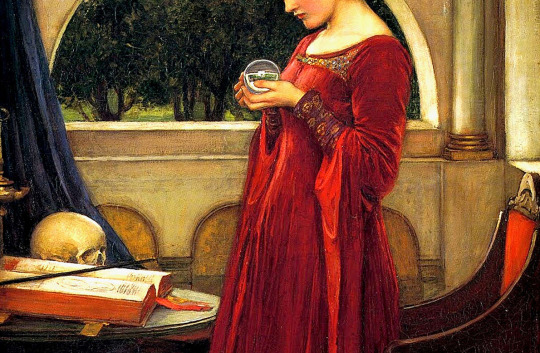
Magic - change wrought through unnatural means
Most fantasy can be placed along a spectrum where there are 3 main points: soft magic at one end, hard magic at the other, and a middle ground between the two.
Soft Magic
Magic that is not well-defined for the reader.
Generally, we don’t understand where the magic comes from, who can use it, or what its limitations are.
Readers can see this type of magic being used.
But they can never anticipate when magic will be used in the plot because they can’t begin to guess how it works.
You can’t break a rule if the rules don’t exist!
Most stories that feature this system will have the magic users be secondary characters, allowing them to avoid explaining exactly how the magic works.
It’s also argued that without knowing everything about the magic, it tends to hold more wonder and excitement for readers.
Hard Magic
Has very rigid boundaries.
Readers know where the magic comes from, how it’s used, who uses it, and what its boundaries and limitations are.
We know the limitations of the characters and can understand why they can’t simply magic themselves out of any particular challenge.
Stories with hard magic systems do not need to avoid the main character being a magic-wielder, as they have the capacity to explain to the reader what is going on.
A lot of writers this system because it gives them very explicit guidelines to follow in their plot and creates some more satisfying pay-offs for readers.
The Middle Ground
The meeting point between the soft and hard systems.
We might understand a bit about the way the magic works, but not all our questions are answered.
While most of the content adheres to rules, these rules aren’t fully explored.
This system relies on the reader’s suspension of disbelief.
The main character can be a magic-wielder or not, and it’s up to the writer to determine when magic will be used in terms of plot.
How to Choose a System
You can and should use these guiding principles to build your magic system. Remember that you don’t have to choose one or the other. Your system can draw from aspects of both. Just stay aware of the weaknesses of the path you choose, and ensure you utilize its strengths.
Use a hard magic system if:
You are going to use magic to solve problems
Your audience is accustomed to the tropes of hard magic
You are okay with jumping through hoops to expand your system
Your magic doesn’t convey a theme
Use a soft magic system if:
You want to convey a theme through magic
You want to create a sense of wonder
You want the ability to expand easily
You want to be accessible to a broader audience
Your magic won’t regularly be used to solve problems
Branches of Magic
Like most writing processes, there isn’t really a correct place to begin designing a magic system. A common, and efficient, place to start, however, is by choosing what type of magic system(s) you wish to employ, such as:
Nature-based magic: water, earth, fire, air, and everything in between
Divination magic: see beyond sight and peer through time and space
Conjuring magic: move objects through space over any distance
Psychic magic: master the world of the mind
Life and death magic: tap into the very forces of life, death, and un-death with this surprisingly versatile collection
Animal- or creature-exclusive magic: some creatures just do it better
Magitech systems: the blurring lines of sorcery and science give magic a next-gen, high-tech flair
Eclectic magic: it doesn’t have to be “real” magic to have a real effect
Uncommon magic systems: the unsung heroes of fantasy magic
AALC Method
How to create your own magic system using the AALC (Appearance, Abilities, Limits & Cost) Method
Appearance
What the magic looks like
Makes the world feel more exotic
Can cause problems for characters but cannot solve them
Usually tied to a character arc
Abilities
What the magic does
Points calculated based on magical effect, range, number of people affected, and duration
Characters have a finite amount of fuel (mana) to use abilities
More powerful abilities require more fuel
The fuel does not have to be overt for the audience to understand
If points not overt, cannot solve conflicts unless a cost system is added
Limits
Unlimited uses of magical abilities
Abilities stratified in codified levels defined by their limits
The more the levels' abilities and limits are known by the audience, the more they can be used to solve conflicts
Focused on clever uses of abilities against stronger foes
Cost system can be added to enhance dramatic moments
Cost
Costs must be greater than or equal to abilities to make them dramatically satisfying
Costs can include time, exhaustion, materials, sanity, morality, etc.
Adds dilemma to magic by forcing characters to make choices
The greater the character's sacrifice, the more audience satisfaction at conflict resolution

Each system builds on the previous ones, so that Cost Systems use all four, while Point Systems only care about Abilities and Appearance.
Multiple systems can exist within the same story, and systems can harden over the course of the story.
The Force, for instance, has been a Soft, Point, Level, and Cost System depending on who wrote it at the time.
SOFT SYSTEMS (Appearance Only)
Window Dressing - magic for secondary characters; can instigate conflict but cannot solve it; e.g., Gandalf
Soft Villain - No explanation or upper limits needed; makes villains more powerful to make heroes greater underdogs; e.g., The Emperor
Chosen One - Unknown power keeps hero safe throughout story; can be considered plot armor unless earned through character arc
Sort Hero Incomplete - Curse or positive ability the character cannot control; hero still learning limits of ability at story's end; powers and arc continued in next adventure
Soft Hero Complete - Hero embraces ability to complete arc and solve main conflict; magic must become harder in subsequent adventures
POINT SYSTEMS (Appearance + Abilities)
Points Opaque - Non-explicit reservoir of energy fuels powers; cannot solve main problems without cost option because characters finding hidden energy reserve feels like deus ex machina
Points Hard - Both abiliites and points system must be explicit like in video games; becomes about resource management; easy to understand but takes sense of wonder out of magic
LEVEL SYSTEMS (Appearance + Abilities + Limits)
Soft Level Static - Unchanging power without upper limits; cannot solve conflicts because feels repetitive; power must be used cleverly; e.g., Wolverine's healing factor
Soft Level Advancing - Increased powers or new powers with unknown limits; cannot solve conflicts unless tied to a character arc like Soft Hero Complete, at which point "unlocks" new abilities
Hard Level Static - Unchanging abilities with clear-cut limits; can solve conflicts so long as setup is properly seeded, usually resulting in sacrifice; e.g., Genie
Hard Level Advancing - Well-established abilities with limits; can solve conflicts based upon clever uses of abilities, usually against stronger foes; e.g., Airbender
COST SYSTEMS (Appearance + Abilities + Limits + Cost)
Static Cost - Well-established cost remains consistent for each use of ability; can solve conflicts since based on personal sacrifice
Cost Fluctuating - Costs change based upon dramatic need; costs must be greater than or equal to ability; possible costs include lost time, money, sanity, health, memory, life, morality, etc.
Sources: 1 2 3 4 5 6 ⚜ Writing Notes ⚜ Writing Resources PDFs Writing Notes: Magic System ⚜ Fictional Items; Poisons ⚜ Fantasy
#writing reference#fantasy#magic system#writeblr#dark academia#spilled ink#fiction#creative writing#novel#writers on tumblr#literature#writing prompt#poets on tumblr#poetry#writing prompts#light academia#lit#writing tips#writing inspiration#writing ideas#john william waterhouse#writing resources
792 notes
·
View notes
Text
Ok. I’m still trying to gather my thoughts and settle my hyperfixation after episode 3 of the Percy Jackson show, but one of my conclusions is that this is one of very few adaptations that actually understands the term ‘adaptation’ and furthermore what makes one successful.
On a fundamental level, understanding and respecting the source material is a must. You need to not just know the bullet points of the story, but you need to know the ‘why’s’- why does this story need to be heard, why do people like it, why does it stand out from the others in it’s genre, etc.
Second, you need to deconstruct the source material and piece it back together in a way that makes sense for the new format. Copy-pasting almost never works, since there will inevitably be discrepancies between the readers’ imagination and the adaptation that can distract from immersion.
Third, you need to provide something new. Why does this story deserve to be told in a different format? What can this add to the original themes of a story? What can we change to make the message come across more on screen? Will this dialogue really be as funny when it’s said out loud?
We’ve seen a lot of terrible “adaptations” of animation and books and musicals into movies/tv shows, and I think even among the better ones there is a dissonance between the desire to stay faithful to the source and the desire to make a good adaptation, with whatever changes that may necessitate.
I think while we’ve watched the casting of this series, the hints here and there, and final the premiere with bated breath, they’ve been playing the long game. They cast Walker as Percy before he was in the Adam Project. Many people expressed…unsavory…feelings when Leah was cast as Annabeth, but those of us that trusted the team behind this project- including the author himself- did our best to welcome her and were repaid tenfold with her performance in this episode particularly.
Most of the scenes in this episode were not at all how I imagined them in the book, but I adored it. They took what they were given and expanded on it. They created a mini-arc for the trio learning to trust each other. They gave Medusa a labyrinthine lair. Annabeth is a 12 year old walking into a convenience store for the first time in 6+ years with $200 in her pocket, of course she’s gonna buy as much as she can carry.
The love and care and artistry that went into this single episode brings me so much joy and gives me so much hope. Like I was already excited for a faithful adaptation, but seeing these characters come to life on screen, once you see their chemistry with each other and how they speak and push and pull at each other’s emotions, it has never been more clear to me the amount of care and foresight that went into this show.
Rick said that these kids are the characters he created and for like 2 years I’ve trusted that that was true, but today it was proven beyond the shadow of a doubt.
I am just…in awe.
#nothing but praise here#pjo#percy jackon and the olympians#percy jackson and the olympians#pjo episode 3#pjo tv#pjo tv show#adaptation#pjo meta#walker scobell#leah sava jeffries#rick riordan#percy jackson#jess’s thoughts
2K notes
·
View notes
Text
Perhaps, in another realm
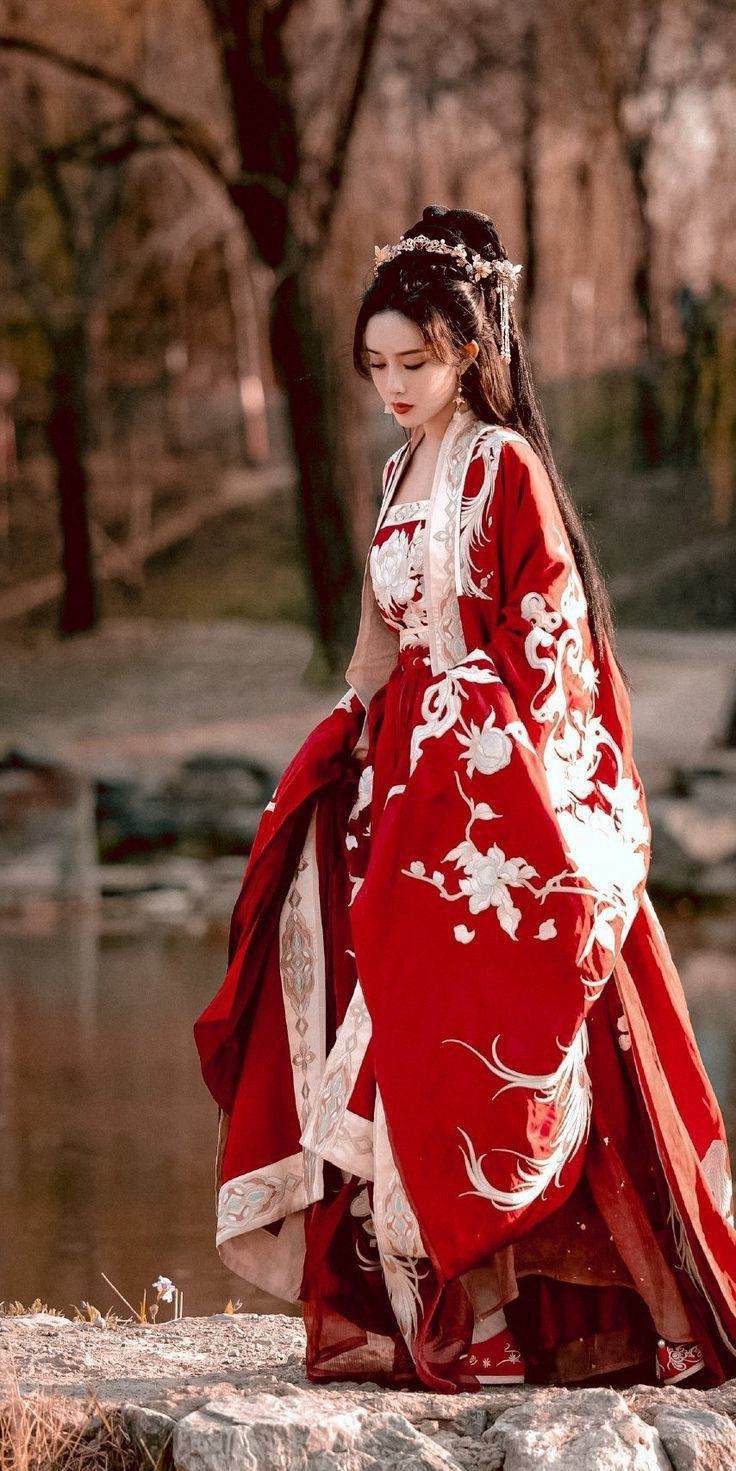
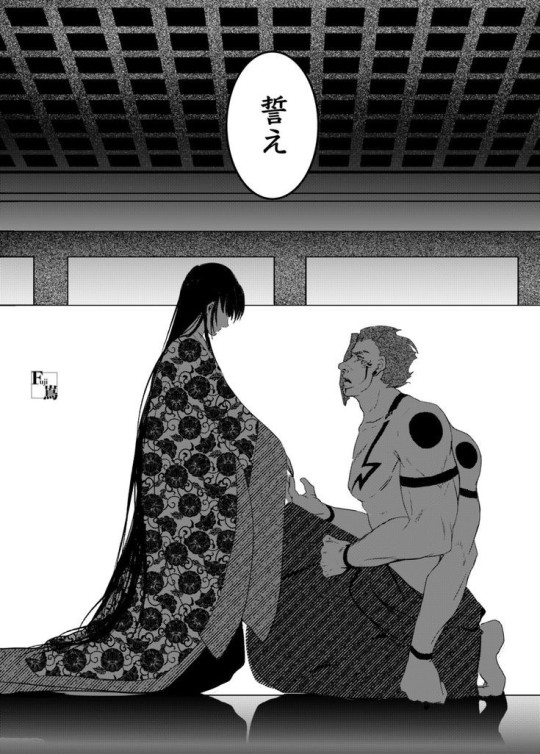
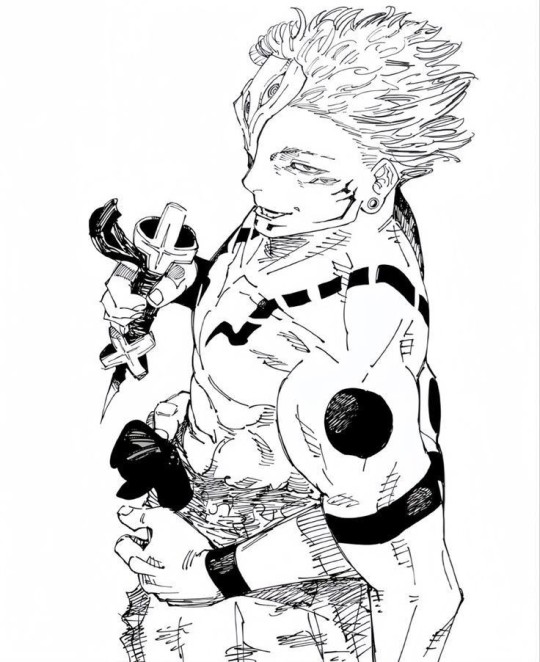
Ryomen Sukuna x Fem!Reader
Synopsis: An elixir of life – you, destined solely for his consumption. Yet, in his pursuit, he forgot, he sipped away your essence, your breath of life.
Tropes: Dark romance, Historical fiction, Angst, fluff.
Warnings: implied nsfw, implied forced intimacy, forced marriage, baby-trapping, knife play, yandere themes, isolation, trauma, one-sided love implied, non-explicit violence, mild stockholm syndrome(to empathize with one's captor), misogyny, minor character death, healthily unhealthy relationship, Sukuna being a red-green flag, Sukuna has eyes for no one except his wife.
General Warnings: Heian Era, strict Japanese setting, usage of Japanese terms(glossary provided), True form!Sukuna, husband!Sukuna, wife!reader, usage of nicknames, no mentions of y/n.
Word Count: 3.7k
Glossary || Pictures

Ryomen Sukuna beholds secrets which he musn't.
Each dawn's awakening, he notes the sun's radiant dance on your irises. Marking the gentle arc of your lips, a telltale sign of mirth's embrace. By the garden's edge, he watches as the winds tousle and play with your hair curls.
With each flicker of your essence, he can't help but feel a pang of frustration at his own inability to guard his heart against the allure of your presence. Each time your unpredictability unfolds before him, he curses his own vulnerability for the arising tenderness within him.
It vexes him deeply.
Gnawing at the recesses of his, once assumed, dormant heart. Yet, now brought to life by unknown sensations – fuzzy and irksome.
An elixir of life – you. Meant to be solely consumed by him.
Your intricate curls destined to be twirled in his fingers alone. Singularly, he'd stand as the privileged observer, captivated by your brilliant elegance. Your figure draped in the resplendent folds of an opulent kimono, delicately bestowed upon you by his hands.
Thus, he embarked on the sole course he could comprehend – take you.
Splitting you away from the familiarity of a family, hearth and hamlet; for in his eyes, your fragile essence demands his safeguarding against this wicked, cruel realm.
Persuading you, that a life enfolded in his embrace had no reason for trepidation. Your purity, too immaculate to endure the harshness of existence.
Yet, persuasion faltered; your resolute heart held no inclination to remain in his grasp. Mounting a relentless siege, to break free from him and his distorted path.
"You crave peril as I assume, so be it," He conceded. "But know this: I'll be the sole peril haunting your very being."
Pressed beneath the weight of his body upon the bed, your resistance proves to be futile against his strength. Leaving you ensnared in a struggle where defiance falters in presence of his immense power.
"Isn't this what you desired? Didn't you yearn for peril?" He questions, his forefinger trailed across the delicate curve of your neck, assessing the rhythmic beat of your pulse point.
"Fear not, I shall burn the world down to literal ashes until none poses a threat to you, save for me, of course."
For danger, befalling upon you while his eyes held the witness and hands were the forebearer of pain – he'd allow. After all, he embodied peril, haunting humanity for centuries.
"My dearest," He began, twirling a blade before your defiant gaze. "I've wielded this to afflict your kin but fear not, it shall yield pure ecstacy for you."
Said so, he thrusted the timber end of the blade within your slick, delicate folds. Your screams shunned out over his malevolent laughter, fingers twisted the cotton sheets as he glided the blade in-and-out of you.
Blood dripped down his wounded hand, staining the white to red, yet his countenance held no response to pain. Gaze fixated upon your shuddering form, underneath him.
He was no stranger to the acts committed in bed. Knowledgeable of all ministrations and threads he needed to ensnared in order to make it pleasurable. Yet, you found no pleasure in this undoing.
The act of intimacy, which you envisioned to be filled with love while your lover would pepper kisses on your skin much akin to the gentle touch of spring's warmth.
That dream left shattered like shards of glass when your chastity was cruelly left to ruins under his harsh caress.
The night stretched on, your anguish unending as he remained vigilant, subjecting you to his torment.
When it ceased, he gingerly held your fragility while tears streamed down your eyes. He cradled your head in his palm, enfolding your trembling form against his chest as he murmured endearments into your parched ears.
You feebly hit on his chest, for you were seeking comfort from your captor – a sickening act.
He brought you pain and despair, yet here he was, bringing you solace in his arms. A sickening man, indeed, he was.
And with him, you were to stay.
.
You kneeled before the shrine deity.
Decked in a white shiromuku with traces of pink pattern embellishing the fabric, haori lowered just above your lips – grateful to the one who dressed you. Moisture laden lashes would've been a sight for sore eyes.
Beside you, your husband knelt. A black montsukini hakama draped around your self-proclaimed fiance and soon to be husband. Perhaps, you'd have seized the moment to admire him in such a lavish attire if he didn't commit the acts he did.
Abduction and coercion reigned heavy on your mind, the priest's chanting muffled over your loud thoughts. Your fear of the impending, palpable.
Later, you stood by his side, bedecked in jewels, unknown to you. Countless villagers and curses bowed before you but you were a foreigner to such deference.
It was his decree. For he was the King of curses and you – his consort, his queen.
.
Sukuna witnessed you gazing at the pond situated in his garden.
You gazed upon the lotus blooming at the heart of the pond, longingly. Reaching out for it, the trailing end of your garment splashed in the water – a futile attempt, too distant to grasp.
He stifled a snort on the brink of his lips as he descended into the garden, tethering on the stoned pads placed in between soil – approaching you.
"You desire that flower, wife?"
You rose swiftly, clutching the dampened hem of your attire. Refusing to meet his gaze, you brushed off the fabric, clearing away the soil.
"Apologies," You murmured. "I was just curious."
"That doesn't answer my question." He stated, an arch of his eyebrow at your frame. "Do you yearn for it?"
Standing before him, a hush lingered in the air, mere seconds passing. Fingers fidgeting, you nibbled on your inner cheek.
"Perhaps," you admitted, finally locking eyes with his feet once he takes a step forward. Bracing for the inevitable, you tightly shut your eyes.
You shouldn't have considered it. Entertaining the thought of plucking it behind his back, hoping he wouldn't notice, all the while unaware of his presence. You should have realized. Defiance in the past had met harsh retribution. This would be no exception.
"I beg–"
"Enough," He interjected.
You gritted your teeth, fists clenched tightly. This was worse. A single mistake, and you're sealed to a worse fate.
Yet, the vision never bore life.
He took your right hand, delicately clasping it within his own. Slowly, he pried open each finger, tenderly placing something within. Curiosity overrides your apprehension, and you cautiously open your eyes – finding the lotus nestled in your palm.
Your lips parted in astonishment as you gaze up at him, wonderstruck.
"Apologies should not leave your lips for trying to claim what is rightfully yours." He asserted, a ghost of an arc perched upon his lips.
"You desire something, you speak up," He waited, letting the words sink down. "Its upon me, how I'll bring it to fruition."
.
"You are to accompany master to dinner tonight," Uraume conveyed, head and eyes lowered in a humble bow.
The fusuma slid shut, signaling their departure, leaving you to your solitude once again.
Lately, companionship has been ceased from your existence. Confined to your chambers by Sukuna's decree that none other than he should share a moment with you. Save for his devoted servant and few maids he deemed worthy, who prepared you for the day.
Upon your bed, you rested, gazing into a void. Softly humming a melody, reminiscent of a distant song, echoing from the depths of your memory; harkening down the familial embrace in your ancestral village.
The day commenced to dusk, the sky donning a cloak of darkness – welcoming the night's silhouette.
Attended by chosen handmaidens, you were draped in a lavish kimono of crimson and ivory. Crushed red cherry paste graced your lips, a stroke of kohl ran along your lashlines.
You beheld your reflection, lovely; yet the joy eluded you. Unable to savor your captivating visage amidst your plight.
You were escorted to the dining hall by Uraume. As the doors parted, your captor, your husband, awaited you; seated on the head of the table. You took your place across him, evading his malevolent stare, your attention fixed solely on the delicacies presented by the servants.
"Afraid to meet my gaze, wife?" He inquired, his smirk palpable in his tone.
Still, you didn't meet his gaze, eyes fixed on your folded hands resting neatly on your lap. "I fear, I am not deserving to meet your eyes, your highness."
His sight danced upon your figure, measuring you as though you were his quarry. A chuckle escaped him as he poured the sake in his ochoko, indulging in a sip.
"Amusing, how you speak so when you are moons away from birthing my offspring, wife."
Your frame grew rigid, lips drawn tight whilst you glanced at your burgeoning womb.
Restraints couldn't bond you to him forever, he comprehended that moons past. Thus, he had to resort to unruly stratagems. Seeding you with his progeny – rendering you incapable of fleeing him.
If only, you acquiesced and remained by his side, as he craved, he wouldn't have acted thus. But your resolve left him with no alternative.
Not a matter to ponder his head upon, he would've planted his seed in you eventually. A kinship with you, his aspiration.
"I wouldn't leave you famished in such a state, wife. Begin eating." He declared, slicing a strip of meat with his chopsticks.
Eating, as if it were possible in such a condition. The satisfaction of a hearty meal has long deserted you. You didn't suspect the flavors of dishes perched before you. Furthermore, you lacked appetite.
You partook in meals solely to survive.
With adjoined palms, you offered a silent prayer to the almighty reigning above you. And so, you began.
.
Blood bathed the tatami mats of your chambers.
A severed head of a, newly appointed, handmaiden, laid near your feet. Her corpse, probably resulted into hundreds– no thousands of strips, indistinguishable.
Your stance remained rigid and motionless. Terror evident on your countenance, fragile fingertips shaking with shock and apprehension.
"Ah wife," Your husband's voice echoed in your ears. He approached you, stepping over the puddle of blood and sliced flesh.
"You weren't supposed to witness that– come," He gingerly caressed your skin, ushering you out of his chambers with a hand on your back.
"Uraume," He summoned his loyal servant, as on cue, they knelt before their master. "Have the maids tidy this mess."
With the subtle nod, Uraume pivoted around, carrying out their master's command alike a proclamation from thee almighty.
Snapping a life wasn't on his schedule today. He wished to spent it with you, hence summoning you back to your chambers.
Perhaps, a foolish handmaiden, attracted by his visage, made the decision to lure him with her appeal. Lowering her uniform to display her curve of of breast, singing praises of his brilliance to him.
Taken him to be resembling any ordinary man, giving into his desires by just any woman's revealed skin. Alas! He had no interest in any woman other than his wife.
An act of like that, only receives the treatment he'd bestow upon any mortal other than you.
Death.
.
"I must say, you look lovely, my queen." Twirling a strand of your hair, he pushed it behind your ear.
Upon the engawa of your husband's abode, you knelt, sight fixated on the swarm of fireflies illuminating the garden.
Sukuna held his stance beside you, lower two hands bearing his weight behind, the third perched upon his arched knee. He set the kiseru down with the fourth, his thumb and forefinger lifted your chin; coaxing your towards him.
"Intriguing, you are," He remarked, eyebrow arched.
"Such defiance you displayed upon our initial union, and now, you show indifference. Continuously subjecting me to such blank stares and compliance." A hint of exasperation lingered his tone.
"Isn't that what you wished for?" You retorted, a moment later.
Drawing you near, his lips brushed against yours, "Perhaps, I did do." He murmured, breath caressing your cheeks, prompting a flutter of your eyelids.
"But now, I yearn for something greater."
With that, he seized your lips in a fervent, fiery kiss. Only parting, a hair's breath away, to allow you to catch your breath.
He pivoted you gently, drawing you into his embrace. Two arms encircled your waist, one caressing your swollen belly. Third, Brushing aside your hair, you heard the tinkling of ornaments. Moments later, a chain adorned your neck, a crimson gemstone nestled between your collarbones.
"Ruby?"
"Rubies are ill-suited during pregnancy, its diamond" He corrected, whispering beside your ear, securing the clasp of the chain. "Unlike most, this one's tint sets it apart than rest."
"For what?" You questioned, assessing the gem like it were poison. Grasping it between your middle finger and thumb, the lantern lights reflected on its surface. Though small, you knew it amounted to more than your ancestral wealth.
"Do I need a reason to spoil my wife with jewels?"
A moment passed in silence, your gazed him through your peripheral vision, the next. "Perhaps not, its beautiul."
"Turn around," He commanded, you complied instinctively. Turning your body to face him.
His gaze met yours at first, second they drifted to the chain bedecked on your neck and on third, he glanced at both, at once.
The jewel's radiance evoked with you being it's wearer.
A grin cracked upon his lips, gingerly holding your cheek in his calloused hands in which you begrudgingly leaned in. With a mouth, summoned on his palm, he placed a chaste kiss on your skin.
"Just how Intriguing you are, wife."
.
Love for your son eluded you.
A splitting image of his father with the identical hair and carmine tinted eyes. You pondered if he'd grow up to be just like your husband.
At days, you couldn't muster the courage to cast your eyes upon him. His mere presence: a testament to your plight, evidence that you were no longer the woman you once were and evidence to your compliance to Sukuna's desires.
Even then, you never shied away from your duties as a mother.
Perhaps, some love existed, for he wielded your flesh and blood too.
You were rendered from ever escaping. Though half-heartedly, you didn't wish to leave your child with Sukuna even though you despised both of their existence.
In this era, nurturing a child as a sole woman was beyond grasp. For all held the thought, as a woman your sole duty was to remain by your husband's side and bear his offspring.
You couldn't return to your home either. Your father, though loved you, would never let you set foot in his abode ever again.
Reasons: You were abducted by a man, your chastity stripped off of you. You were no longer pure in any sense.
He wouldn't tarnish his family name and reputation for just a daughter.
Moreover, your matrimony with the wicked, king of curses had reached rivers far; binding you to his side forever.
Peril loomed at every turn, dangling your life by a single thread. Easily snapped by even the weakest of men. Sukuna's adversaries would leave no stone unturned to reach him, venturing as far to lay down the life of his innocent wife. Someone absolved of his transgressions.
Reluctantly, you accepted that remaining by his side was the wisest decision.
You cradled your son in your embrace, rocking him back and forth as you hummed a lullaby to put him to sleep.
Once his snores serenaded the room, you tenderly placed him upon his cot, adjacent to your own resting place. Gentle pats graced his chest, once you noted him stirring in the embrace of slumber.
"Come to bed," Your husband's voice echoed in your ears. Compliance swiped in your being, a swift rotation of your heels after you had checked your son to be far from awakening. You parted the curtains and perched upon the bed – lying beside your husband.
His arms encircled around your waist, drawing you to his chest, he inhaled your scent.
Your body tensed when his lips brushed against your nape. You dreaded the inevitable.
Six moons had passed, since he last embraced you intimately. The last two, post your son's arrival, were a blur of exhaustion. From tending to your physical strain and catering to your son's ceaseless crave of attention.
Tonight, all you longed for was to surrender yourself to slumber, wrapped in embrace of gentle linens. Alas, it seemed that wish would remain unfulfilled.
You were keenly aware of his intentions tonight – for he was but a man. Thus, you braced yourself.
You waited in anticipation, for him to act on his desires. Yet, it did not come to pass.
You cracked your eyelids open, stealing a glance at him. His carmine eyes met yours in a resolute stare, holding it with unwavering poise.
"Retire to sleep," he finally remarked, tenderly brushing aside the tendrils from your weary visage.
A year prior, during the early nights of your newly forged union, you would have taken a moment to contemplate his actions, perhaps even staying awake the entire night to discern his intentions.
Now, whether out of trust or simply exhaustion from the demands of motherhood – you found yourself slipping into a dreamless slumber without further ado.
The haunting nightmare of humanity, he was; yet, you found solace in falling asleep in his embrace.
.
His son has taken just after you.
Verily, his offspring could be likened unto a veritable likeness of himself in countenance, yet in comportment and carriage, he bespoke tales of you.
Awaking to the crack of dawn, shedding tears should companionship elude him. Taking solace in the embrace of the verdant garden, to which you oft escorted him. Even directing reproachful glances towards him, his father, whilst cradled lovingly in his paternal arms.
Beneath your eyes lay heavy shadows, hollows etched upon your cheeks, and a perpetual frown graced your lips, save for moments spent conversing with your offspring.
Sukuna escorted his sobbing kin from their chambers, affording you the much-needed respite that has eluded you of late; his offspring casted a disdainful gaze upon him.
"What? Speak up if you wish to," He queried, a playful lilt adorning his speech.
He tenderly traced his son's tender cheek with his claw, wary of leaving any mark upon his cherubic visage. His son seized his finger in both tiny hands, elevating it as though clutching a covert weapon – scrutinizing the nail and the ridges with keen interest.
His little one beamed, a gesture akin to the gentle breeze of summer, bestowed upon him by the heavens above. A giggle swift past his lips – a laughter, he assumed angel's melody wouldn't sound better.
His smile was yours – Sukuna realized. Perhaps, he hadn't completely taken after him in physical features.
Rocking his form back and forth on his arms, a tender smile danced upon his lips.
"Lower the tone, child. Your mother rests inside."
.
Sukuna couldn't help but contemplate alternative scenarios.
He sipped his sake, his gaze fixed upon your figure, leaning against the amado – your eyes lingering on the cherry blossom trees outside, in the garden.
The fragrance of spring permeated the air, imbuing a soothing atmosphere, starkly contrasting with the terror he instilled upon the village beyond the river.
At moments such as these, he can't help but ponder on the possibility of attaining a kinship with you, without resorting to unruly methods.
His thoughts rewind to the clash conversation he shared with you, mere moments past.
In your gaze, defiance ablazed, aimed straight at him.
"What's your intent? To end my life? Proceed, now. Who held you back? Proceed. Perhaps, I'd choose that fate over spending another day with you."
"Make no mistake," You pressed on. "My sentiment for you isn't love, don't deceive yourself. What festers within me is pure, unadulterated hate."
How could he let slip from memory? A curse he was, brutal and unyielding. Unwelcomed, marked with shame – The disgraceful one. How could he fail to recall? Love's realm, forever beyond the reach of his reach.
He seized you, by means unorthodox yet deemed vital. Yet, he finds himself lost in contemplation.
What if he had treaded a different path?
Would a love aglow your heart if he had courted you in a proper manner? Would you accept him in your life – a husband, a companion, a lover? Would you had willingly become his?
For your presence brought his heart back to life; in doing so, the life and light was lost from your eyes.
Scorned by the desire to claim you as his, the thought of your own desires, feelings was pushed to the desolate corners of his mind.
In another realm, he assumes– in another realm, he might have treated you properly from the very beginning.
In another realm, you wouldn't have to have a lingering threat struck on your mind. You wouldn't fear him.
In a realm beyond, you'd stand beside him by choice, not coercion. A realm where he'd navigate every step flawlessly. A realm where, instead of vowing to set the world ablaze for you, he'd pledge to journey with you until the world's end.
Perhaps, in another realm, you'd fall in love with him like he did for you in this.

A/N: uhm uhm uhm, just typed down an idea which I had for days + I used a new format of literal english (idk how it turned out, I am so sorry if it's cringe 😭) + I fucking don't know how to end stories so bear with me.
#ryomen sukuna#ryomen sukuna x reader#sukuna ryomen x reader#sukuna ryomen#ryomen x reader#sukuna x reader#yandere ryomen sukuna#yandere sukuna x reader#yandere sukuna#sukuna jjk#jjk sukuna#jjk x reder#jujutsu kaisen x reader#sukuna x you#sukuna x y/n#sukuna#sukuna jujutsu kaisen#jujutsu kaìsen#jujutsu kaisen fanfic#sukuna ryomen smut#sukuna ryomen fluff#sukuna ryomen angst
2K notes
·
View notes
Text
the narrative that could have been
Having mulled over the game for a couple of days I have realised that the main problem for me is that Veilguard is good based on the premises they ultimately choose, but not based on the set up and promise of what was there before. I know this isn’t a unique take by any means and yes it’s all about the Evanuris and the Veil and Solas.
Replaying really emphasises how incredibly little the game convinces me of its original main quest - to prevent Solas from doing his ritual. This is a problem as a long-term player because for three games we’ve had build up for a great crescendo tackling the overarching themes of the (restrictions and oppression of) magic, of tears in the Veil, of religious tyranny and oppression based on myths about the Black City and the temptations of flawed humans, we’ve seen and deconstructed the elves quite a bit, we got started on the dwarves and in DAI your Inquisitor can openly ask Solas if it wouldn’t be better if the Veil came down because then spirits wouldn’t be separated from the living and risk becoming demons. Cole, whose function is to reflect the plot, talks endlessly about the old songs wanting to be sung again, about how it hurts to be cut off from part of yourself, how the templars feel it, how the mages feel it, how the elves and the dwarves feel it. The Veil as a prerequisite for life has been deconstructed, the Fade demystified, the gods have mostly fallen. The Veil as an actual wound inflicted on this earth has been presented as a theory and not been convincingly rejected by the narrative.
The game actually gives no explanation whatsoever as to why the Veil coming down would be worse than what Rook causes in the beginning and what the escaped gods then do to the entire Thedas. The entire south falls to the Blight because Elgar’nan and Ghilan'nain are let loose. The Wardens are more or less wiped out. There’s enormous political turmoil. The game gives us Solas saying “thousands” would die when he brought the Veil down, but that he had a host of spirits there to help. (Yes, I know, his sole function in this game is to Trick and Deceive so who is to say if he’s lying, HUH, but even so, THE ENTIRE SOUTH FALLS TO THE BLIGHT IN ROOK’S VERSION OF THINGS.)
The game puts emphasis on Solas's questionable methods and past horrors but it doesn't ever explain why his goals are despicable here and now. It doesn't convince us that tearing down the Veil with lots of safety measures in place and after considerations is a bad result, all things considered - save for Varric’s initial yelling about demons. (We even learned in DAI that the Veil itself creates demons because it restricts the passage of spirits, come on.) Because three games have suggested it's not, not ultimately. Trespasser especially nuances this, just as it nuances Solas’s view of this current world state. Right after his long nap he would have nuked it all, I’m sure, but the whole point of character arcs is that things happen in them and what happened to him is that he was shown layers and angles he had not considered and adjusted his mindset and ultimately his plan accordingly. That is where DAV should have picked it up. That's where the build up was headed. But, now he must serve the narrative solely as the God of Treachery and Lies which means that previous build up is washed away for the most part. (In no way do I think he is OOC in DAV, I just want to point that out so nobody thinks I’m a sappy fangirl or whatever. I think he is perfectly in tune with his inner Dread Wolf, but that is also all he gets to be, because of the narrative, and I’m always much more interested in when roles and personas clash.) Again. The main problem is that the narrative cannot explain why bringing down the Veil would be the worse option than the shit we see unfold on screen. Instead it gets a bit lost in the past. And I have Issues with that, as well. Like, the dumbing down of the war against the Evanuris. The war that started because the leaders of the rebellion - who previously had to carry out terrible orders so the Evanuris, the upper crust of the Elvhenan, could play gods - decided that the Evanuris was a threat to them all. And the game gives us what, a depiction of how the rebellion ended up crossing lines, too? No shit.
Like, I am fully on board with the individual theme of regret on Solas’s part and he ought to be wrecked with guilt but I wish the game could be less all over the place with what sort of things he ought to be wrecked with guilt over. Saying fuck you to the Evanuris is the best and brightest of his character, I suppose I just don't want it dragged down to the same level as him breaking the Titans. I suppose I would have wished for a narrative that also worked on a systemic level when depicting things like, you know, war and revolutions and subjugation. But we don't have that, because DAV is only about personal choices. The Lighthouse crew flippantly writing the hierarchical and violent power struggle off as being about love and betrayal is on my shitlist forever.

No, Taash et al, it was not about pussy, it was about feeling compelled by superiors to commit heinous war crimes and being lied to about the actual purposes of your damn war in the first place. The elves shouting at Elgar’nan and Mythal in this painting aren’t driven by love and sex they have been lied to by their ruling class. It was never about freedom or ending the wars, it was always about Elgar’nan jerking off to ultimate godhood. The writing even suggests betrayal here is to be understood as Netflix drama betrayal, maybe some juicy porny plot but it’s ABOUT THE BETRAYAL OF THE ELVES BY THEIR OWN KIN. ((ETA: I would have wanted my Dalish mage to be allowed to be furious, NOT WITH SOLAS, but with the fucking Evanuris for betraying her people and being so fucking vile that the only option that remained was to create a world where she's a second-class citizen. I would have wanted the game to recognize that not all causes are equal and that Elgar'nan's cause for godhood was objectively more vile than Solas's cause for freedom because as it stands now, there are some really iffy vibes of "both sides are equally bad" and other things authorities tend to say when comparing destructive regimes with uprisings.)) I’m sorry, this shit hits me on a personal and political rage level.
I also can’t help but mourn a game where the Trickster God fulfilled his trope’s duty and shook the stagnation apart with his actions - for good or ill, the way trickster gods are wont to do - and where Rook was tricked into helping and then, a more complex game about its consequences could have unfolded. The Evanuris could still have been the bad guys, if they wanted big villains frothing at the mouth. There could still have been numerous unplanned consequences, like all of Solas's plans have. Maybe other ancients awake as well. Maybe ancient evils who aren’t elves, who knows. Point is - the Veil should have come down, at least in some form, at least in some outcome. THAT is what they've been building up to. In this game that never was, Rook could be an actual interesting character where we could mold her as either accepting of this trickster role (which fits perfectly for a blank slate with no ties) or set to overturn it and enforce status quo, with some vanilla option in the middle. Maybe the Veil doesn’t come down until the very end of the game, ancient magic takes time after all, maybe a lot has happened by then. But ultimately, Rook’s choice in the end should not have been about siding against Solas because he’s lying to you or because he did horrible things in the past or siding with him because you want him redeemed. The narrative should have provided those options either way. The narrative should have been brave enough to suggest that hey, maybe Solas isn't wrong at all - his methods maybe, but his goal, no. If they truly wanted mirrors between Rook and Solas, Rook should have tackled the issue of actively bringing down the Veil herself, not because it's a roses and sunshine-outcome but because it might very well be the lesser of two evils. Gods, that would have been interesting. It should have been a choice about what sort of world Rook and the Veilguard wants to see in the future. It should have been about the people, the world, not how angry Rook is that an ancient elf has tricked her.
That would have been the game I wanted to play. This story doesn't really give anything new to the world of Thedas, which a world without the Veil would have. It accomplishes closure for our favourite trickster god and bless them for that, but as for the plot and the world-building it ends on a meh because the narrative isn't about the people unless they're brought up as being endangered. This is why I can feel satisfaction regarding the thematic conclusion to certain character arcs, the trickster becomes the healer with the bloodiest hands, the wolf submits willingly to his trap and so on and so forth, and I can have fun with the characters and their arcs but also really mourn the game that was there, in subtext and build up over three previous games and in several tie-ins.
431 notes
·
View notes
Note
I love Sabo as a character so much! However something about his introduction into the story has bothered me for a while. Oda is a master story teller but it truly feels a bit like Sabo whole existence was dropped into our laps out of nowhere. What's your opinion on his introduction? And if you could, what would you change?
Thank you so much for all your amazing art! Always sparks joy.
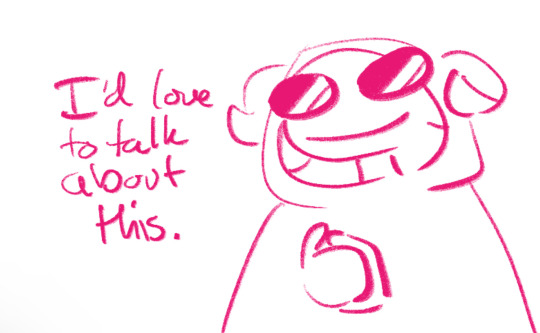
Hello hello! I also love Sabo a lot and as such theres a lot that I’ve had to come to terms with and work out with myself. I’ll let you in on my brain worms and what they’ve concluded with this subject though so hopefully some kind of weight is lifted off your shoulders, cuz right now, i think his introduction was done really well.
So first off, All Of Luffy’s family members’s whole existences were dropped into our laps out of nowhere, to be fair.
Luffy is not one to talk about his family or his past at all. So i dont blame him for not telling us directly about sabo when he barely told us about ace as he stood in front of us in Alabasta. But even if he doesnt talk about his family, for me, it’s very easy to see what Sabo’s influence on and especially what the loss of him taught Luffy before we even officially see him. We see it especially in water 7/enis lobby/sabaody arcs. During the course of the story up to that point, we don’t really see the world government, but even so, we see Luffy’s complete understanding of the cruelty and heartache it creates. We see his utter determination to not let a single other person he loves be taken away by the world government, too.
Also in Arlong Park! We see him understand what someone’s sacrifice on his behalf looks like. He knows how it ended last time. He’s not going to let it happen again and seeing it happen again in arlong park and water 7 and sabaody and Marineford absolutely kills him. Omg not even to mention Shanks losing his arm, too. This man is completely surrounded by people sacrificing themselves for him wtf. But like Shanks’ situation didnt give him that patented World Government Hatred, babeyyyyyy
And with how he was reintroduced officially in dressrosa, i think it was very artistically done. Like having all those themes and parallels to Luffy’s childhood, even going so far as him pointing them out, himself. That, and the Mera Mera No Mi coming back into the story, it gets you thinking back on Luffy’s backstory and what his brotherhood meant to him. So like Sabo’s already in the back of your mind from that and then youre also thinking “well who the hell is gonna get this fruit once Luffy wins it??” So when Sabo comes back i just feel like “of course. Of course it could be no one else but you.”
Also E S P E C I A L L Y with introducing Sabo, famous Amnesia Patient, back into the story during an arc that explores the absolute horrors of being forgotten and being the one forgetting???? Like truly the most opportune moment to get him back in there. I really love the Dressrosa arc, i think it’s all done very well.
I feel like if it was just Ace and Luffy, it would feel incomplete. Like Sabo’s part in their backstories just adds such a delicious spice to the age old dynamic of “older brother who dies for younger brother who he loves a lot.”
Like tell me Ace’s Death would hit the same if Ace didnt already know what it felt like to lose a brother.
His passing is already beyond tragic but like Sabo’s whole part in it just makes it so much more tragic in a way thats just 😚🤌 mwah~❤️ 𝕷𝖎𝖋𝖊 𝕽𝖚𝖎𝖓𝖎𝖓𝖌.
Sabo’s presence also adds a very personal level to Luffy’s understanding of the world he lived in. Like the big picture. I really think that if sabo wasnt occupying that space, Luffy wouldnt try to even know about the WG or class warfare or bother with any of that shit. Sabo is Luffy’s draw to the world around him me thinks. Like of course he would have to face that stuff when he went pirating, but those lessons would not have been taught to him before he got out there without Sabo.
This is the same in present day, like why would Luffy care at all about the Rev Army if Sabo wasnt in it? He’d be very thankful that they took Robin in, but like he wouldnt be actively asking about how the Rev Army was doing if his big bro wasnt a big part of it.
Also on that note of Sabo being in the Rev Army, I think that before Ace’s death and Sabo regaining his memory, Sabo wouldve been sneaky and largely unseen. Like yeah he barges into marine fortresses to take them down, but usually there isnt any survivors to tell the tales of him doing so. So before the timeskip, Sabo is out of the public eye. Out of any eye, really. But in my mind, when he regains his memory, i think he would do his level best to get his name out there. Thats why we see all those people in the colosseum/dressrosa be like “:O!!!! ITS THE CHIEF OF STAFF OF THE REV ARMY NOOOO” its cuz all his inhibitions left him. So like his face would be in news papers but luffy doesnt read news papers to find that Sabo’s alive and doing shit.
I think that Sabo took so long to let luffy know he was alive because he was scared luffy would hate him. I think he was scared of the potential scorn from his little brother he feels he wouldve been justified in getting. I think that if luffy was not put in a position where he wouldnt be able to fight in the colosseum anymore due to Law Getting Shot And Taken Off circumstances, Sabo wouldve let Luff keep going all the way to the end. But in that moment, Sabo knew that the fruit was no longer in his little brother’s capable hands and had to take matters into his own. Like we see him thinking about this in the episode of Sabo. We see him slowly following luffy around, listening, waiting, understanding the complexities of his situation, and ultimately making the decision to swap places with him.
I could literally talk about this forever i love talking about this forever and ever theres so much to discuss.
I’ve heard criticisms that Sabo’s amnesia story feels like fanfiction, but like,,, I just cant stop thinking about the hilarity of it all. Like why do you care that all this is all convenient, when it’s kinda funny. Like image you’re explaining your tragic backstory to someone and like you have to be like “now i know this sounds really. Really. Convenient. And ironic. But it’s My Life and I’ve had to Live Through It so please dont laugh.” Like idk!! ITS KINDA FUNNY!!!!!!!!!
I dont think i would be able to change anything about Sabo’s presence in the story without someone being out of character if im being honest. Like Luffy doesnt bring up his past, Ace doesnt like bringing up things that cause him pain, and we dont meet anyone else who knew he even existed until we see Luff’s backstory.
There’s a panel in the logue town arc though, that kinda looks like Sabo standing in the crowd. I think that maybe in the reanimated show or even the life action, if we could get a closer visual on him, just to see that he exists there, i think that would be neat.
Thanks for the question and kind words! Hope you enjoyed the long rant, i could rant for 2000000 more paragraphs but I’ll cut it there for now.
#sorry for any typos#whery qna#@ammo-never-runs-out-of-knives#sabo talk#op spoilers#marineford spoilers#one piece spoilers#dressrosa spoilers#long post#sabo#monkey d. luffy#asl brothers#portgas d. ace#sabo the revolutionary
382 notes
·
View notes
Note
A fun question your opinion: In each arc, what do you think is the theme of each arc? ( It can be a motif, messages, subject)
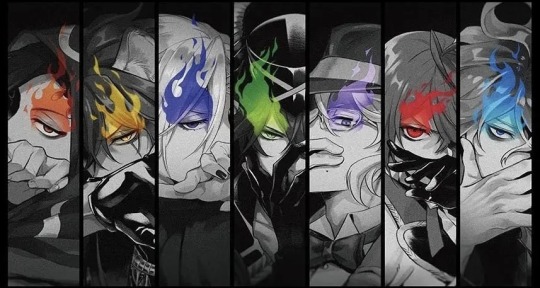
These are a mix of jokes and serious thoughts ^^ just to avoid the post from being too heavy overall!
The Rose-Red Tyrant:
Breaking free from perpetuating a cycle of abuse
You are your own person, not a puppet controlled by your parent/guardian
At the same time, you have to take accountability for your own actions (your background can explain your poor behavior toward others but it does not excuse that behavior)
Control that is too constrictive will only push away potential connections and experiences, keeping you isolated and complacent
Anger management classes are good for you, guys
The Usurper from the Wilds:
Let’s play fairly and be good sports!
Judging people for their merits rather than by titles or birth
What makes someone worthy to lead is noble behavior and attiude
Standing up for what’s morally right, even if everyone else seems to be against you
You have value, worth, and hope in spite of what others may tell you and put you down for
It’s totally okay to get revenge on the asshole that tripped you that one time/j
It’s technically not a crime if you don’t get caught (except Leona did, in fact, get caught)
The Merchant from the Depths:
Don’t be ashamed of your past self—embrace it, accept it, and use it as a point of reference for self growth
Be the bigger person rather than becoming a bully yourself
Let your accomplishments speak for themselves
There is no “easy way out” or shortcut; be prepared to face the consequences of your actions
Not everything is as it may seem (think about the “trick” with Azul’s contracts)
… Read the terms and conditions very carefully and think things over before you sign a contract 💀
Schemer of the Scalding Sands:
Wow, this baby can fit so much generational trauma!!
Sometimes you just miss each other’s messages or greatly misinterpret the other’s intentions (Kalim giving Jamil the benefit of the doubt, Jamil obviously being the Bad Guy and everyone else has to point that out to Kalim)
There’s a very complicated relationship between those in power and those without power; this can breed hatred for those at the top
Talent and skill left unacknowledged can fester into resentment
Institutions of higher education can and will accept monetary bribes, what are you gonna do about it?
Not everyone wants to reconcile and make friends; this is okay and should be more normalized
A Beautiful Tyrant:
You can try your best and work hard, but life doesn’t owe you anything (depressing thought, but unfortunately true)
Beauty is not limited to just one’s looks; beauty can also extend to one’s character and actions
Your worth shouldn’t come from external forces; if you are satisfied with yourself, you will always be “beautiful” no matter how you look or what losses you may experience
Public opinion and the entertainment industry are brutal af
Screw gender norms 😤
The Watchman of the Underworld:
The grieving process in general
Moving on from the past instead of fixating on it and letting the past consume your present and hold you back from a future
Learning to forgive yourself
Reaching out and making new support systems/opening up to others to help you cope
Bearing the sins of your ancestors (Shroud family curse)
The Lord of Malevolence:
Change is inevitable, all good things must come to an end; we must learn to accept them and bravely move toward the future
Love endures, transcending race (Sebek), blood (Silver), and time (Lilia)
Self-sacrificial love (Maleanor for Malleus, Lilia for the other Diasomnia boys, Dawn Knight for his own family, etc.)
Is it “true” happiness if it is a fake reality, a convenient dream?
We hate and fear what we do not understand, even though we have the capacity to
You cannot live forever in a happy fantasy world where none of your loved ones/favorite characters leave you, your trauma doesn’t exist, and everything conveniently pans out how you want it to; sooner or later, you must “wake up” and face reality (this point is particularly meta; it applies both in-game and in the real world, speaking to us players and our relationship with the escapist fictional content we consume)
Prologue: Welcome to the Villains’ World and Overall Main Story:
The power of friendship :))
Revisionist history (cuz… y’know… Great Seven and all)
We’re stronger together than alone
It’s okay to rely on others
We may be very different people from very different backgrounds, but it is still possible for us to understand one another
#twisted wonderland#twst#Riddle Rosehearts#Leona Kingscholar#Jamil Viper#disney twisted wonderland#disney twst#notes from the writing raven#question#Azul Ashengrotto#Idia Shroud#Vil Schoenheit#Malleus Draconia#prologue spoilers#book 1 spoilers#book 2 spoilers#book 3 spoilers#book 4 spoilers#book 5 spoilers#book 6 spoilers#book 7 spoilers#Kalim Al-Asim#Scarabia#Sebek Zigvolt#Silver#Diasomnia#Lilia Vanrouge#Maleanor Draconia#Meleanor Draconia#Dawn Knight
1K notes
·
View notes
Text
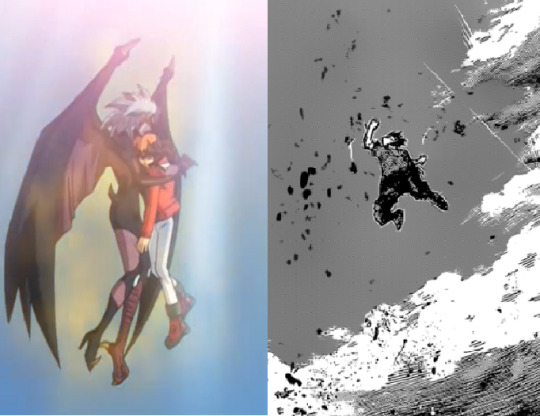
SHIGARAKI VS. YUBEL: HOW TO SAVE YOUR VILLAIN
The failure of Deku to save Shigaraki isn’t just a tragic conclusion for Shigaraki’s arc, it’s also My Hero Academia failing as a story. When I say the story failed, I mean the story has failed to answer any of the questions it asked its audience. It’s themes, character arcs, everything that communicates the meaning of the story to the audience is no longer clear.
Saving Shigaraki was the central goal of not only the story itself, but the main character Deku. By failing in its goal you can’t call this a good ending. In order to illustrate why this goal of saving the villain is so important to both Deku’s character and the central idea of MHA, I’m going to provide a positive example in Yu-Gi-Oh GX were the main character Judai successfully saves their villain. One of these stories fails, and the other succeeds. I will illustrate why under the cut.
BROKEN THEMES = BROKEN STORY
When artists draw they have to consider things like perspective, anatomy, shading, light, coloring. Drawing has rules, and it’s hard to produce good art without knowing these rules beforehand. If I draw something that has bad anatomy, you can criticize me for that.
Writing has rules, just like drawing. The rules of storytelling are important because writing is an act of communication. You can write whatever you want, just like how you can draw whatever you want, but if you break the rules the audience won’t understand what you are trying to communicate.
When I refer to MHA as a broken story, I am referring to the fact that it has broken the rules of storytelling. As this youtuber explains.
“I guess we should first define what broke and broken even means in this context. Has the story turned into an unintelligible mess? Not really. Value judgements aside, the narrative is still functional and fulfills the criteria of being a story. So how can a story that still functions be broken? Maybe to you it cannot. But to me a story that is still functional isn’t enough. What I mean when I say MHA is broken is that it’s lost something crucial. A codifying style of structure, pacing and payoff that until a certain point was the core of its identity.”
I could launch into a long-winded explanation of what themes are, but for the sake of simplicity I like to define themes in terms of “Ask, and answer.” The author asks a question to the audience, and then by the end of the story provides an answer. The audience is also invited to come up with their own answer which prompts them to think about the story on a deeper level. The question both MHA and GX are asking both its main characters and the audience is “Can you save the villain?” with the additional complicated question of “Should you save the villain?” This post will detail how both stories go about answering those two questions, and more importantly why those answers matter for the story.
With Great Power… You know the rest.
My Hero Academia and Yu-Gi-Oh Gx are actually similar stories once you get past their superficial differences. MHA is a story with way better worldbuilding, compared to a society where everything revolves around the trading card game, and people go to school to be better at a trading card game.
However, if you get past that. They are both bildungsroman, stories about the main characters growing up into adults. They both have an academy setting where the goal is for the main character to graduate and enter the adult world. They are both shonen manga. GX is the sequel of Yu-Gi-Oh a manga that ran in Shonen Jump the exact same magazine as MHA. The biggest point of comparison is their main characters, who both start out as young and naive who are driven by their admiration of heroes. Deku is a fan of All Might who wants to become a hero despite not having a quirk, because he loves All might who saves everyone with a smile. Judai’s entire deck archetype revolves around “Elemental Heroes’ and later “Neo-Spacians” who are all based on popular sentai heroes like ultraman.
The central arc for both characters is to grow up. Growing up for both of them not only requires figuring out what kind of adult they want to be, but also what kind of hero they want to be.
Now I’m going to drastically oversimplify what a character arc is.
A character arc first starts out with the character being wrong. Being wrong is essential because if the character is right from the beginning, then there’s no point in telling the story. A character often holds the wrong idea about the world, or has some sort of flaw that hinders their growth. The narrative then needs to challenge them on that flaw. It usually sets up some kind of goal or win condition. That flaw gets in the way of a character “winning” or achieving their goal, so they need to fix that flaw first. If their ideals are wrong, then they need to think about what the right ideals are. If they’re too childish, they need to grow up. If they have unhealthy behaviors or coping mechanisms, they need to unlearn it and require better ones. Otherwise, that flaw will keep sabotaging them until the end.
I’m borrowing the word “win condition” from class1akids here because it’s an incredibly appropriate terminology. Midoriya needs to do “x” in order to win, otherwise this victory doesn’t feel earned. The “x” in this case is usually character development. As I said before, a story where the main character hasn’t changed from beginning to end feels pointless. Especially in Deku’s case, he was already a brave, strong hero who would charge right into battle and defeat the bad guys in chapter one, so him defeating Shigaraki in a fist fight doesn’t represent a change.
The story sets up not only “What does the hero need to do to win?” but also “How does the hero need to change in order to win?” A character either meets these requirements before the end of the story, or they don’t and usually this results in a negative ending.
MHA in its first half quite clearly set up both the final conflict of saving the villains, and also that saving the villains is its “win conditions.” The hero shouldn't be allowed to win without first fixing this flaw.
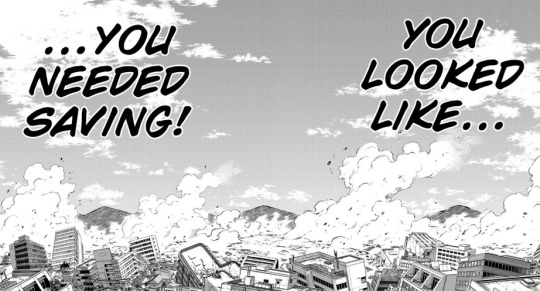
From this panel onward the central question Deku is forced to answer shifts from “Am I strong enough to defeat ShigarakI” to “Can I save Shigaraki?” However, much earlier than that All Might goes on to basically set up the win conditions of what makes the ultimate hero as someone who “Saves by winning, and wins by saving.”
All might: You can become the ultimate heroes. Ones who save by winning, and win by saving.
Therefore the story has set it’s criteria for what kind of hero Deku needs to become. If he wins without saving, then he’s failed to become what the series has set up as the Ultimate Hero.
Shigaraki and Yubel aren’t just narrative obstacles, or boss monsters to be killed like in a video game. They are narrative challenges, which means that the character can’t grow in any way if they don’t answer the challenge presented by the characters. They are villains who actively resist being saved, to provide a challenge for two heroes who define their heroism by saving others. The challenge they pose adds a third question to the story and the main characters.
"Can I save the villain?"
"Should I save the villain?"
"If I don't save the villain, then can I really call myself a hero?"
In other words the decision they make in saving, or not saving their final antagonist defines what kind of hero they are. In Deku’s case it’s even more critical he defines what hero he wants to be because the MHA is also a generational story, and several of the kids are asked to prove how exactly this generation of heroes is going to surpass the last one. The kids growing physically stronger than the last generation isn’t a satisfactory answer, Deku getting strong enough to punch Shigaraki hard is not a satisfactory answer, because we are reading a story and not watching a boxing match.
I’m going to focus on the last two questions though for a moment. Many people who argue against saving villains like Shigaraki argue he is a mass murderer and therefore isn’t worthy of salvation. However, the act of saving Shigaraki isn’t a reflection of Shigaraki himself, but rather the kind of hero Deku wants to be. It all boils down to Spiderman. In the opening issue of Spiderman, teenage Peter Parker is bitten by a radioactive spider and suddenly gains super strength, the ability to stick to walls along with other powers. However, being a teenager he uses these powers selfishly at first. He doesn’t feel the obligation to use his powers for other people, and therefore when he sees a robbery happening right in front of him he lets the robber go. However, because he lets the robber go, the robber then attempts to hijack a car and kills his Uncle Ben in the process. If Spiderman had stopped the robber then he might have prevented that from happening. He had the power to stop the robber, but he didn’t feel responsible or obligated to save other people. As a result Uncle Ben dies. It’s not enough to have power, ti’s how you use that power that reflects who you are, therefore: “with great power comes great responsibility.”
The choice to save Shigaraki actually has little to do with whether or not Shigaraki is redeemable, but rather how Deku chooses to use his power, and what he thinks he is responsible for reflects who Deku is as a person. Deku himself also clearly outlines how he wants to use his power, that One for All is a power for saving, and not killing.
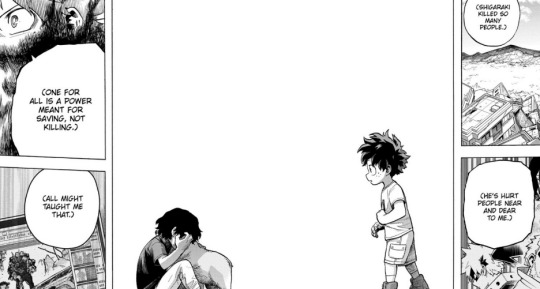
How he uses his power reflects Deku’s ideal in saving others, and therefore if he doesnt use his power to save, then he’s failed to live up to his ideals. It's not whether it's morally right to save a murderer like Shigaraki, but rather the way Deku wants to choose to use his power. It's about whether he feels the responsibility to save others.
Judai explores an incredibly similar arc to Deku. They are basically both asked what kind of responsibilities a hero is supposed to have, which is also a metaphor for growing up to handle the responsibilities of adulthood. As both characters start out with incredibly naive and childish ideas about what a hero is. Therefore realizing what a hero is responsible for is key to them growing as a character. However, Judai is different from Deku. In some ways he’s more like Bakugo. Judai is a prodigy who’s naturally good at dueling. He doesn’t duel to save others, but rather because duels are fun and he’s good at it. He’s very much like Bakugo, who admired All Might as a hero just as much as Deku did, but admired the fact that he was strong and always won rather than he saved others.
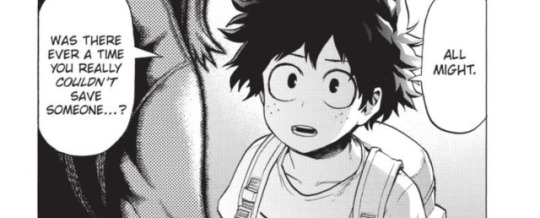
However, I would say both Deku and Judai are questioning what a hero is responsible for. They are both asking if they have the responsibility to use their power to save others. If they have to fight for other people, just because they have power. His first big challenge as a character comes from Edo Phoenix, who calls out Judai for not thinking through what it means to be a hero, and what responsibilities heroes carry. Judai duels because he thinks it’s fun. He will show up to duel to help his friends, but that’s because he’s the most powerful person in the group. Even then it’s because he finds fighting strong opponents to be enjoyable. Bakugo will beat up a villain, but for him it’s more about winning then if the action will save someone or not.
Judai is more often than not pushed into the role of being a hero, he doesn’t play the hero because he’s a particularly selfless person, and he’ll often avoid responsibility if not forced. He has power but no sense of responsibility and the narrative calls them out as a problem.
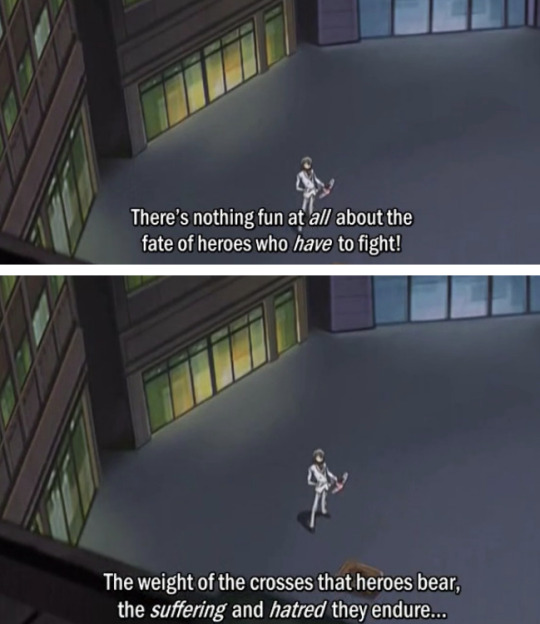
Edo: Can you even fathom that, Judai?
For Judai, he can’t understand the responsibility of being a hero. For Deku, he idealizes heroes so much he can’t understand that there are people out there the heroes have failed to save. These two callouts towards Deku and Judai are discussing similar because they’re both discussing where a hero’s responsibilities lie. Is a hero responsible for saving everyone? Is someone strong like Judai responsible for using their strength to help other people?
Judai’s arc continues into the third season where he’s not shown to just be naive but ignorant. He’s not just childish, he actively resists growing up because he doesn’t want to take on adult responsibilities.
THe same way that Deku just decides not to think about whether or not All Might failed to save people in the panels above. However, in Judai's case he's actively called out for his choice to remain ignorant.
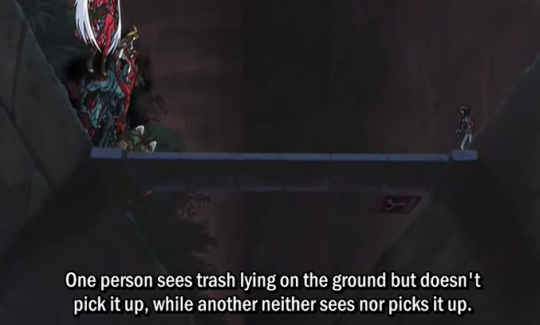
Satou: Now, which one is at fault? Judai: Isn’t it the guy who saw it, but didn’t pick it up. Satou: Not quite. If one is aware of the trash that fell, it may be picked up someday. But there is no possibility fo the unaware one ever picking it up. Judai-kun you are the foolish one unaware of the trash that has fallen. Judai: Are you calling me out for how I am? Satou: Your behavior towards me was atrocious. The worst was attending class only for credit, even if you were there you only slept. Judai: Yeah, I know. I was all bad, but it wasn’t that big a- Satou: It is important. You see, one by one, the students inspired by your attitude were losing their motivation. Now if you were a mediocre duelist, then this would not be an issue. Satou: However, you are the same hero who defeated the three mythic demons. Every single student in the academy admires you. You should have been a model for this academy. Judai: Me, a role model? Are you kidding? I just do whatever I feel like doing. Satou: Great power comes with great responsibility. Yet, as you remain unaware of that, you’ve spread your lethargy and self-indulgence.
seems like a minor issue, but look how Judai responds to the accusations. “I just do whatever I feel like doing.” Satou is arguing that Judai should pay attention to the influence he has on others because of his power, because how he chooses to use that power affects others. However, Judai chooses to actively not look at the consequences of his actions because he doesn’t want to take on that level of responsibility, and therefore he’s looking away from the trash.
While it seems like it doesn’t matter in Satou’s specific example, not thinking of the consequences, or how you use your power can have unexpected consequences. Spiderman doesn’t feel like it’s his responsibility to stop a bank robber, and that bank robber shoots his uncle. You could still argue it’s not Spiderman’s responsibility to stop every crime in the world, and I guess no one owes anyone anything from that point of view - but Spiderman failing to act responsibility had the consequence of directly hurting someone else.
Spiderman has to live with that consequence because it was his own Uncle that was hurt. This is where we really reach the duality of Judai.
In GX, Judai is, symbolically speaking, The Fool of the Tarot Deck, the Novice Alchemist — a person brimming with infinite potential, yet one who is also supremely ignorant, who walks forward with his eyes closed and often unknowingly causes harm in his great ignorance. In this, he is very much the embodiment of the faults we most commonly associate with teenagers — selfishness, recklessness, shallowness, a lack of dedication or empathy when it’s most needed. Like most people, he has good traits that work to balance out some of the above, but his narrative path through GX ends up being that of the flawed hero undone by his faults — and then that of the atoner, the repentant sinner. In his case, the mistakes of his teenage years are the catalyst for his growth from a boy into a man burdened with duty and purpose. Judai is someone with infinite potential, with great power, but also ignorant on how he should use that power, and that makes him an incredibly flawed hero who needs to learn how that power should be used.
Deku similarly exists in a society where heroes deliberately turn a blind eye to the suffering of a certain type of victim. Shigaraki’s speech heavily resmebles Satou’s speech about garbage on the side of the road.
Shigarali: "For generations you pretended not to see those you coudln't protect and swept their pain under the rug. It's tainted everything you've built."
Deku shares Judai’s ignorance, because he’s not only a part of a system that doesn’t even see trash on the side of the road, but he also worships heroes so much that he’s incapable of criticizing them. If Deku saw the flaws of heroes, but at first didn’t have the courage to speak out, but eventually gained the courage that would be one thing. However, if he doesn’t see the flaws of heroes, then the problem will never be fixed.
There are also consequences for both Judai and Deku failing to use their powers responsibly. These consequences take the form of the villains who came about because of all of society’s ignorance to the suffering of victims (Shigaraki) and because of the main character’s ignorance to their suffering (Yubel). Shigaraki and Yubel are also explicitly victims that the heroes failed to save, turned into villains who are active threats to the heroes.
Should I save the villain?
The answer is yes, because the decision to save is reflective of the kind of hero each character wants to be. Each story clearly sets up that Deku and Judai aren’t punisher style heroes who shoot their villains, they are being set up as heroes who save. Deku needs to “save by winning.” As for Judai, a big deal is made of Judai’s admiration for another character Johan who represents a more idealistic kind of hero. Johan unlike Judai is someone who duels with a purpose, something Judai outright says he admires because he’s empty in comparison.
Judai: Johan what have you been dueling for? See, it’s about fun for me… Well, for the surprise and happiness too. I guess I do do it for the fun. Sorry, I guess I put you on the spot by asking out of nowhere. Johan: What’s this about Judai? Judai: It’s nothing. Johan: I suppose there is one goal I have. Johan: Even if someone doesn’t have the power to see spirits, they can still form a bond with a spirit. That’s why I do it for people like him. [...] Johan: I'll fight for everyone who believes in me, and I'll do it with my Duel Monsters. Judai: I'm jealous you've got feelings like those in you.
Becoming a hero who uses their power to help others isn’t just a goal the story sets for Judai, it’s a goal that Judai sets for himself because of his admiration for Johan. Johan represents the idealistic hero Judai wants to be, but is also held back from because of his personality flaws. Johan represents the kind of heroic ideal that Deku is aspiring to be.
Johan’s ultimate goal isn’t punishing the wicked, but to use his power to save others.
Johan: Judai, it was my dream to save everyone through my dueling!
The story sets up the idea that it’s not enough for Judai to simply be strong, he’s also challenged to become a savior who uses his power to help others like Johan. Deku needs to “save by winning” and Judai needs to “Save everyone through his dueling.” However, Johan also adds another condition to what saving means. His idea of saving isn’t to defeat a villain, but rather his dream is to help connect spirits and humans together, even if there are humans who can’t see spirits. Johan doesn’t save people with the power of physical force, but rather the power of human connection.
Should I save the villain?
Here the answer is "Yes", because wants to become more like Johan someone who uses their power to help others not just for themselves. Then we reach the third question
If I don't save the villain, can I really call myself a hero?
It once again comes to power and responsibility. Heroes have great power, and they are responsible in how they use that power, if they use it irresponsibly then there are consequences. Shigaraki wants to destroy hero society, because the heroes irresponsibly use their power to turn a blind eye to everyone’s suffering.
People suffer when heroes fail to live up to their responsibilities. The entire conflict of season 3 is created by Judai failing to save Yubel. If Judai had helped Yubel when they most needed it, instead of abandoning them, then Yubel would never have been twisted by the light of destruction, would never have attempted to teleport the school to another dimension, would never have attacked all of JUdai’s friends.
These consequences matter. Deku can turn his eyes away from Shigaraki’s suffering, but let’s say a hero failed to stop a robbery, or rather he didn’t even try, and because of that his mom was shot and died in the street. Would Deku consider the man who failed to stop a bank robbery a hero? When Spiderman let a bank robber go instead of trying to stop him, was he being a hero in that moment? Both the stories and the characters themselves have defined heroes as people who use their powers to save others, therefore if Judai and Yubel fail to save their villains then they can’t be called heroes by the story’s own definition. Now let’s finally return to the question of "Can I save the villain?"
Was there ever someone you couldn’t save?
m going to start with Yu-Gi-Oh Gx as a positive example of how to save your villain. Gx works for two reasons. One, it’s established from the start that Yubel isn’t beyond salvation, and two, it makes it so Judai can’t win without saving Yubel. The conflict of the story does not end until Judai makes the decision to save Yubel. In some ways the writing is even stronger because Judai is directly responsible for the pain and suffering that Yubel went through that turned them into a villain in the first place. Yubel isn’t just a victim, they’re specifically Judai’s victim.
Yubel is a duel spirit who is also essentially Judai’s childhood friend. A duel spirit just like the kind that Johan wants to save. During their childhood Yubel got too overprotective of Judai, and started to curse his friends for making him cry or upsetting him in any way. Until everyone Judai’s age started avoiding him and Judai became all alone with only Yubel for company. Judai’s decision was to abandon Yubel at that time. He took the yubel card and shot them into space, hoping that being bathed in space rays will somehow “fix” what was wrong with them. I know that’s silly but just go with it. Judai abandoning Yubel had the unintended consequence of Yubel being subjected to the light of destruction, a corrupting light that subjected Yubel to years of pain. This pain literally takes the form of Yubel burning alive.
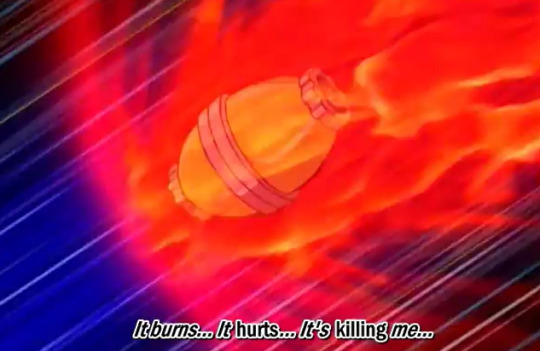
Yubel connected to his dreams called out for Judai every night, only for Judai’s parents to give him surgery that repressed his memories of Yubel causing him to forget them entirely. Yubel then spent the next ten years alone in space, continuously subjected to painful torture, with their cries for help being ignored.
"I was suffering even as you came to forget about me..."
Yubel is then met with the question of how can Judai treat them this way if they loved him so much? As from Yubel’s perspective, they’ve only ever tried to protect Judai, only for Judai to not only throw them away, but subject them to painful torture and ignore their cries for help. Judai effectively moves on with his life, goes to duel academy, makes friends while Yubel is left to suffer in silence all but forgotten. This is where Judai’s ignorance has serious plot consequences.
It’s not just the pain that Yubel endured that made them snap. It’s that their pain went ignored.
Yubel holds out the faint hope that Judai will answer their calls fro help until they finally burn up upon re-entry into earth’s orbit. At which point they’re left as nothing more than a single hand crawling on the ground. Yubel who cannot fathom why Judai would cause them so much pain, and then forget about them, convinces themselves that Judai must be causing them pain, BECAUSE he loves them.
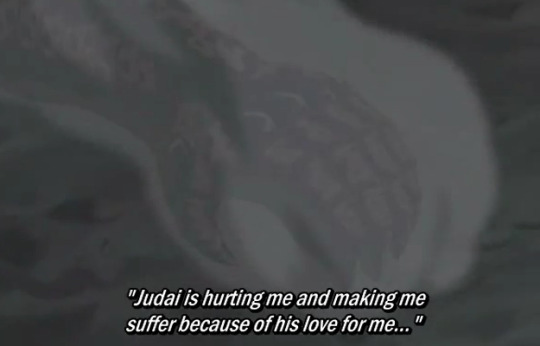
But you see, I couldn't possibly forget about you in the time that I've suffered...
Judai is allowed to move on with his life, to make friends, to spend the next ten years doing so while Yubel is subjected to ten years of agony. When they finally escape their painful torment, they see all the friends Judai has made while they’re left alone and forgotten. However, Yubel’s goal isn’t revenge. Rather, it’s to make Judai share and recognize their pain. WHich is why I said it’s not the fact that they were made to suffer, but their suffering is ignored. Yubel’s entire philosophy revolves around the idea that sharing pain is an expression of love, and that they and Judai share their love for each other by hurting each other.
"That's why I sought to fill all those linked to you, your world, with both sadness and anguish..."
For Yubel, making all of Judai’s friends suffer and Judai themselves suffer is a way of making them and Judai equals again. They want to show “their love” for Judai, but it’s more about forcing Judai to recognize the pain he’s caused them by forcing him through the same pain. Yubel’s philosophy of sharing pain is actually a twisted form of empathy.
They’re not entirely wrong either, that even people who love each other can cause each other pain, and that if one person is suffering alone in a relationship or the suffering is one-sided then there’s something wrong with that relationship.
Yubel: I get it now… You weren’t in love, with Echo. Yubel: No.. you may have loved her just enough to clear the conditions in palace for you to control Exodia, but the you didn’t truly love each other. Yubel: You were only unfairly hurting her, while you stayed unharmed. You wouldn’t suffer. You wouldn’t suffer. You wouldn’t be in pain. Amon: What are you getting at? Yubel: I’ve been hurt! I’ve suffered! I’ve been in pain. That’s why I’m making JUdai feel the same things I did!
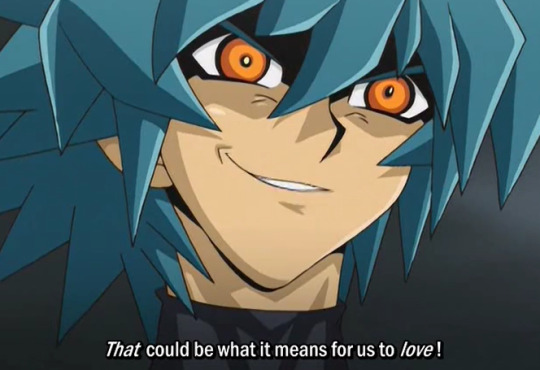
Yubel’s twisted theory of love, is a pretty thinly veiled cry for empathy.
They break out into tears when talking to Amon about the way they’ve hurt and suffered. They clearly state upfront that their goal is for Judai to recognize their love. One of the first things they say to Judai is a plea for Judai to remember them.
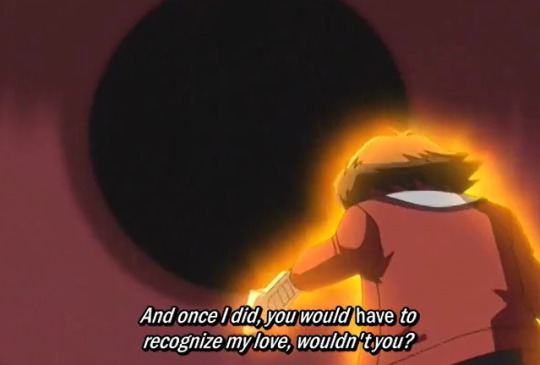
Yubel is presented as a very human character suffering through a lot of pain throughout their entire villai arc, they break down into tears multiple times, they cry out in agony, they're visibly suffering and you see their mental walls begin to break down when Judai denies them any empathy.
Yubel is actually incredibly clear and straightforward about their desire to be saved by Judai. However, Judai doesn’t lift a single finger to help Yubel the entire arc, even though they themselves admit they are directly responsible for Yubel’s suffering but they helped create who they are today.
Judai plunges into a different dimension and gives up everything to save someone, but it’s Johan, not Yubel they try to save. You have Johan, the perfect friend, and perfect victim that Judai gets obsessed over and will not stop at anything to save, and then you have Yubel, the imperfect victim that is actively harming Judai and all of his friends that Judai chooses to ignore. The whole season Judai only focuses on saving the perfect victim Johan, and this is clearly shown to be a flaw. Judai doesn’t just ignore Yubel to save Johan, he also ignores every single one of his friends.
Judai only caring about saving Johan, and deliberately ignoring and abandoning the friends who came with him to help, essentially abandoning them the way he did Yubel leads to another consequence. After he abandons them they get captured, rounded up, and actually die and become human sacrifices.
Losing his friends, causes Judai to snap. Judai becomes the supreme king and decides power is all that matters; he starts killing duel spirits en masse in order to forge the super polymerization card. Which means being left alone, suffering alone, being abandoned by everyone causes Judai to snap the exact same way that Yubel did.
In fact Judai is only saved from his darkest moment, because two of his friends sacrifice their lives, trying to get through to him and appeal to his humanity. At that point Judai’s friends could have just chosen to put him down like a mad dog, to punish him for the amount of people he’s killed, but instead they try to save him because of their friendship.
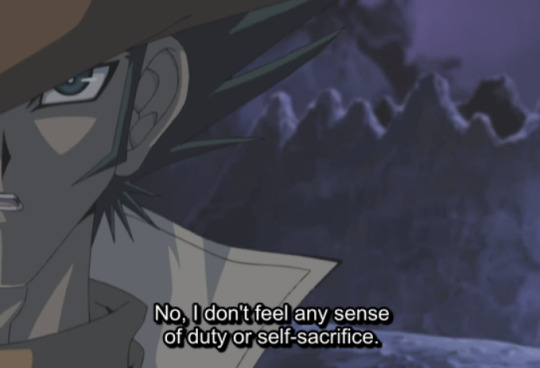
I just want to save my friend. That is all.
By the time Judai is facing Yubel in their final fight, Judai doesn’t have the moral highground against Yubel in any way whatsoever. They’ve both lashed out because of the pain they endured and killed countless people in the process of lashing out. The only real difference between them is that Judai is lucky. He had friends to support him at his lowest point, while Yubel didn’t. Does Judai learn from Jim’s example, and go out of their way to save Yubel the same way they were saved because Yubel is still a friend? Nope, Judai tries to kill Yubel at this point.
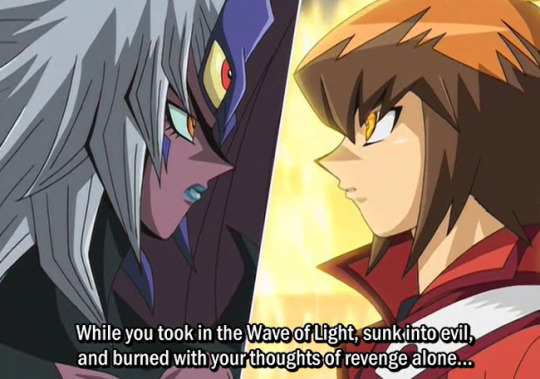
I made a lot of friends... And they all taught me something… real love is wide enough, large enough and deep enough to fill the universe. Your so-called love is only a conceited delusion.
Like, Judai, sweetie baby honey darling. How was Yubel supposed to make friends when they were floating in the empty void of space?
Judai hasn’t learned, they are still ignorant, and still turn a blind eye to Yubel’s suffering. After all if his love is wide enough, large enough,and deep enough to fill the universe then why don’t thy have any room in their heart whatsoever for empathizing with Yubel?
Judai making friends while Yubel was trapped in space doesn’t make Judai a better person than Yubel, it makes Judai lucky. Judai doesn’t even appreciate that luck, because he treats his friends like garbage. It’s not about whether Yubel is worthy of salvation, because Judai is a mass murderer and his friends still went to great lengths to save them anyway. It’s that Judai doesn’t want to empathize with Yubel, because they still want to remain ignorant and irresponsible. Judai wants to continue playing hero, with a very black and white definition of what a hero is. By this point Judai’s killed lots of people, but if he makes Yubel the villain in the situation, he can keep playing hero. He doesn’t have to look at himself and what he’s done, because blaming everything that happened on Yubel and then putting Yubel down like a mad dog allows Judai to absolve his own guilt. Judai practically ignores Yubel’s cries for help, even when Yubel spells it out for them.

I couldn't have lived with the heartache unless I felt that I was being loved...
At this point Yubel themselves acknowledges that their love was just a delusion. That it was a coping mechanism, because they couldn’t live with all the pain otherwise. WIthout it they would have just died, which makes Judai unmoved. The implication here is that Judai thinks yes, Yubel should have just died in that crater. It would have been easier for Yubel to die a perfect victim, then for Yubel to crawl out of that crater and go on to hurt other people. While that may be true the same can be said for Judai - it would have been better if Judai died rather than become the Supreme King. His friends could have put him down like a mad dog, you could have even called that justice - but they didn’t. Judai making no attempt to save Yubel isn’t because he thinks it’s morally wrong to save someone who’s killed as many people as Yubel has, or because he thinks he can’t forgive Yubel, it’s because Judai is taking the easy way out. Johan is a nice, easy victim to save, because he’s Judai’s perfect boyfriend, while Yubel is a complex victim that requires Judai to understand their suffering. Even the act of saving Johan isn’t about Johan himself, it’s about the fact that Judai feels guilt over Johan’s disappearance. What Judai wants isn’t really to save a friend, but to stop feeling guilty over that friend. Judai isn’t just disgusted by Yubel’s actions towards his friend, he also wants to avoid the guilt he feels over causing all of Yubel’s suffering, because it requires acknowledging the complex reality that he is both victim and perpretrator in this case, just as Yubel is both victim and perpetrator.
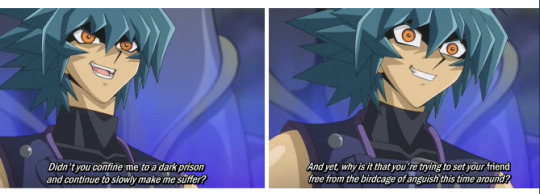
So how can an arc where Judai doesn’t try to save Yubel until the last possible minute, be better than an arc where Deku makes it his goal for the final act of the manga to save the crying boy in Shigaraki?
It’s because the story does not let Judai get away with his continual refusal to empathize with Yubel. Yubel’s entire character revolves around empathy, in the form of sharing pain. As a duel monster, Yubel’s effect is that they are a 0/0 attack monster who is immune to all damage, but when you attack them they deal all the damage back to you. Which means that Yubel will respond to all the pain they feel, by causing you just as much pain in return. Yubel is not a character who can be defeated in a fight, or a duel. In fact they’re the only Yu-Gi-Oh villain who never loses a duel once. The most Judai can do is duel them to a draw, and they draw three times. Yubel wins against everyone else who challenges them. In a way Yubel is like Shigaraki, the ultimate, unkillable enemy that can’t be done away with violence. Judai’s refusal to empathize with Yubel or attempt communication also makes them worse, every time Yubel is hurt they escalate. THe more Judai hurts them, the more they will hurt in return, it’s a cycle that will never be broken simply by killing Yubel, because Yubel is unkillable.
Not only that but the story has gone to great lengths to show that saving Yubel is the correct course of action. If Judai doesn’t save Yubel, he’s basically spitting on the selflessness Jim showed in saving him. In fact if he doesn’t save Yubel, Judai is contradicting his own words on what makes a good friend. Sho once asks Judai after witnessing his brother change, what he should do if a person you lov ehas changed into an entirely different person. What if they're a person you don't even recognize any more? A person you don’t even necessarily like anymore?
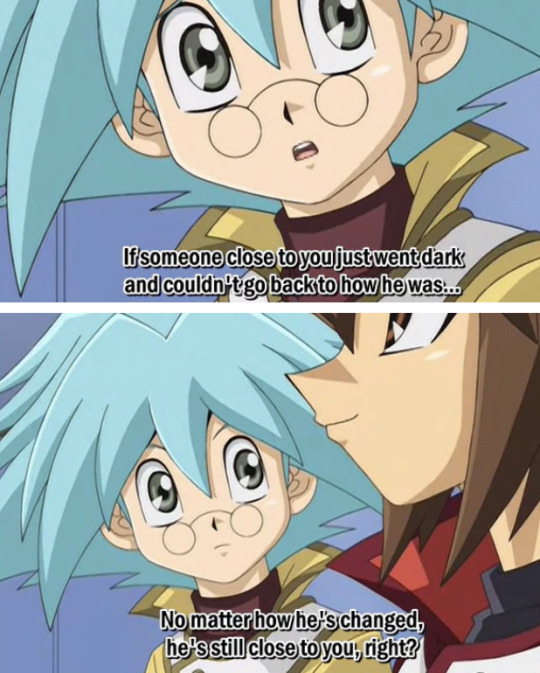
That's why if it were me. I'd probably just be looking after him until the very end, even if I didn't like him. I'd do it cause I think it'd prove that I care about him.
Judai doesn't even say that Sho is obligated to save his brother or morally redeem him, just that he has to keep looking at him instead of turning away or ignoring him.
Judai is being a bad friend, by his own definition. By choosing to deliberately look away from Yubel, Judai’s not living up to his advice for Sho for how you treat people you care about.
Which is why the resolution for Judai and Yubel’s arc is so important, because it’s done by Judai finally acknowledging Yubel’s pain, and promising to watch over them from now on, words that are followed by the action of physically fusing their souls together so they’ll never be alone again. Judai doesn’t just say pretty words about how they won’t ignore the crying child inside of Yubel, but instead he makes a sacrifice to save Yubel at risk to themselves to show their words are backed up by actions. Judai says Yubel will never be alone again, and then he commits.
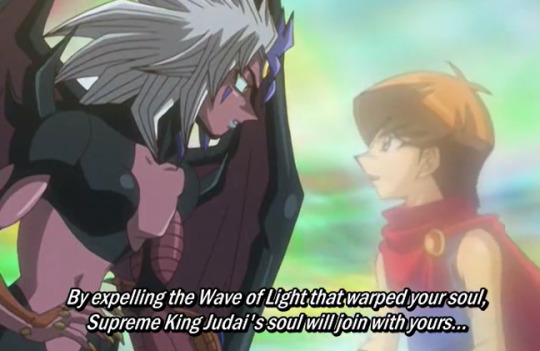
"And even if that means I won't exist anymore... I don't care."
Judai has resolved his character arc by this action, because Judai is finally taking on responsibility and that responsibility is watching over Yubel, so the two of them can atone together. Judai even says himself this isn’t an act of sacrifice on his part, but rather him finally accepting adult responsibilities.
Judai: I wouldn't sacrifice myself for you guys. I'm just going on a journey to grow from a kid into a man.
Judai needed to save Yubel to complete his character arc and grow as a person. If Judai hadn’t saved Yubel, he would have still remained an ignorant child. By learning not to turn a blind eye to Yubel’s pain, and also smacking sacrifices and physically doing something to atone for the way they ignored Yubel up until this point they’ve not only saved Yubel they’ve also done something to address their wrongs. This also continues into the fourth season where Judai’s personal growth results in him learning what kind of hero he wants to be as in Season 4 in order to atone for the spirits that Judai slaughtered, he decides to leave his friends behind and walk the earth with Yubel helping spirits and humans get along with each other. In fact Judai’s final speech as a character isn’t even about how strong he is as a hero, but how weak he is as a person.
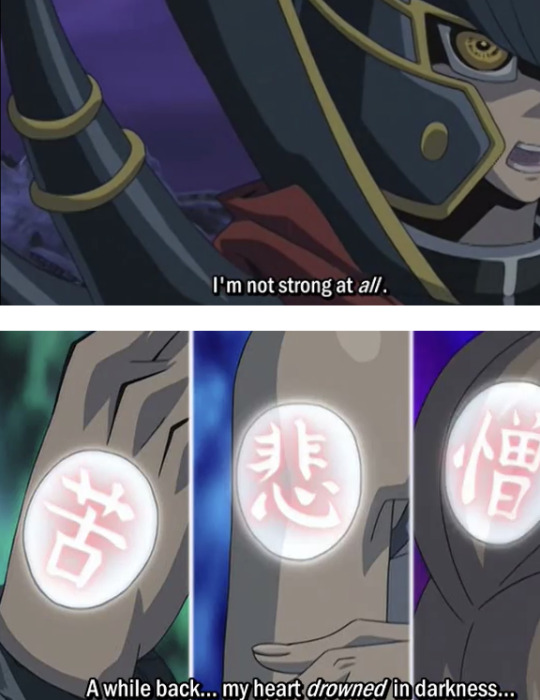
And I put my friends through some rough times. Form that, I figured a few things out... all I can do is believe in them.
The lesson Judai learned is because he’s weak, he needs to empathize and believe in other people the same way that his friends once believed in him when he was at his lowest point. Judai’s not the strongest hero, he’s the weakest one, but that gives him the ability to empathize with people who were lost just like he was, and guide them back from the darkness.
The story of how Deku became the worst hero.
I’m going to say this right now it might turn out next week that Shigaraki is just fine, and he’ll use the overhaul quirk to reconstruct his body. However, even if that happens Deku has completely failed at his goal of saving Shigaraki for the reasons I’ll illustrate below. In theory, Deku’s arc of saving Shigaraki, and therefore winning by saving should be much easier for the story to accomplish and also much less frustrating to watch. After all, Shigaraki has been around since the beginning of the manga, he’s literally the first villain that Deku faces. He’s also the first villain that Deku talks to, where he brings up the idea that there were some people All Might failed to save. There’s also many intentional parallels between the two characters, the entire manga is about their parallel journeys of becoming the next generation hero and the next generation villain. Shigaraki even directly quotes the line at one point that all he wanted was for someone in his house to tell him he could still be a hero, the same line Deku said in the first chapter was that he wanted his mom to tell him to be a hero instead of apoalogizing to him for being quirkless.
Not only is the setup for Shigaraki and Deku made obvious (Deku can redeem Shigaraki by telling him that he can still be a hero too), but Deku himself states out loud that he wants to save the crying child inside of Shigaraki.
Judai runs away from Yubel the whole time, whereas Deku is running towards Shigaraki and actively makes it his goal to understand Shigaraki and continue to see him as a human being rather than a villain. The story also makes it clear that saving Shigaraki is necessary to saving hero society as a whole. After all Yubel is just Judai’s victim. Whereas Shigaraki is the victim of all of society. He’s the crying child who was ignored. The cycle won’t be broken if heroes continue choosing to ignore people like Shigaraki, because more victims will grow up to replace him.
Shigaraki: Everything I've witnessed, this whole system you've built has always rejected me. Now I'm ready to reject it. That's why I destroy. That's why I took this power formyself? Simple enough, yeah? I don't care if you don't understand. That's what makes us heroes and villains.
Shigaraki rejects the world because the world continues to reject him. THe solution to this problem is not rejecting Shigaraki, because Shigaraki won’t go away, the system will just continue to reject people like Shigaraki. As long as heroes and villains don’t understand each other, they’ll keep being forced to fight and the conflict won’t end, because hero society is what engineers it’s own villains.
clear as day by the story itself. If the objective of saving Shigaraki is clear, then how exactly did the story fail in this objective? What went wrong? In this case it’s a failure of framing, and breaking the rules of “show don’t tell.” Stories are all about actions and consequences. When a character makes a certain action in a story, the way other characters around them, the world, and whatever consequences that action frames that action in a certain light. It provides context for how we are supposed to interpret that character in that moment.
For example, when a character does something wrong and another character directly confronts them over what they did wrong, that frames them as in the wrong. The story is criticizing the character for what they did wrong. Context is everything in a story. Stories are just ideas, so they require framing and context to communicate those ideas for the audience. Certain character attributes can be strengths or flaws depending on the context. My go to example is that if you put Othello in Hamlet, the conflict would be resolved in five seconds because Othello’s straightforward personality and determination would have him kill Hamlet’s uncle without questioning things. Whereas, Hamlet constantly questioning and second guessing himself would lead to the worst ending possible. However, if you put Hamlet in Othello, then Hamlet wouldn’t fall prey to Iago’s manipulations, because Othello doubts and questions everything so he wouldn’t believe Iago the way Othello did.
Hamlet’s contemplative and introverted nature can be a strength in one situation, and a flaw in another. Othello’s tendency to act without thinking things through can be a strength in one situation, and a flaw in another. Context matters, because context tells you how you’re supposed to interpret a certain characters actions, and therefore tells you more about that character. This is why people repeat “Show don’t tell” as the golden rule of storytelling, it’s one thing to say something about a character, it’s another to us the characters actions in the story itself to show them something about the character.
What’s even worse then breaking the rules of show don’t tell however, is telling the audience one thing, and then going onto show in the narrative something completely different. In that case the narrative becomes muddled and confusing to read. If I the narrator say “Hamlet is someone who overthinks everything” and then in the story Hamlet walks up to his uncle and kills him with no hesitation, then the narrator is straight up unreliable. It becomes impossible to tell as an author what message I’m trying to get across about these characters, because I’m telling you one thing and showing another.
This is why the writing fails in the second half of My Hero Academia because we are constantly told one thing, but then the story shows something entirely different and sometimes even contradictory to the thing we are being told.
Judai is a much worse hero than Deku, he always runs away from Yubel, and we’re never directly told that he’s supposed to save Yubel either. However, the narrative is incredibly consistent. Judai’s behavior of running away is consistent with his character. All the other character call Judai selfish for abandoning his friends (and they’re not even talking about Yubel). Judai is never painted in any positive light for his actions, therefore we as the audience understand Judai’s behavior is wrong and he needs to fix it. The narrative makes it clear that Judai needs to grow up, and Judai is never rewarded for his refusal to grow up, he’s ruthlessly chewed out, not by his enemies but also by his own friends. However, the narrative isn’t merciless on him either. Season 3 of GX is dark, but it’s not grimdark. Even when Judai loses his way, he’s still shown love and compassion by those same friends who go to great lengths for his sake. The narrative criticize Judai but it never insists that he’s beyond redemption and needs to be put down like a mad dog.
The message is very clear, that not only does Judai need to grow up, but he also deserves the chance to grow and change, which is why he should give Yubel a similar chance. In comparison the story sets out this clear narrative arc for Deku of understanding Shigaraki, but it never challenges him for failing to understand Shigaraki. If you listen to what the narrative says, how other characters describe Deku, and what Deku himself says and only read it on a surface level then yes, Deku’s goal is to save Shigaraki. If you analyze actions however, he is in effect just like Judai he never takes any meaningful action or steps towards Shigaraki, nor does he think of what saving Shigaraki might look like or entail.
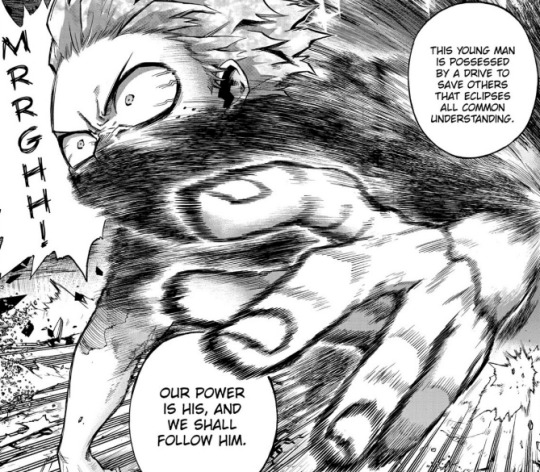
The story describes Deku as someone who is possessed by a drive to save others that eclipses all common understanding, but does the story give us any examples of that behavior?
Judai is characterized as a selfish, irresponsible child, and the story gives us countless examples of his immaturity and how it hurts others. Does the story of MHA do the same for Deku's purported virtues? Let’s run through Deku’s actions, step by step, the actions themselves and how they are framed in order to find any evidence that Deku possesses this drive to save others. Does Deku reflect at all on the question of:
Can Shigaraki be Saved?
Deku leaves on a journey to try to understand villains. When he makes a perfunctory attempt to understand and empathize with Muscle, and Muscle replies that some people are just evil does Deku keep trying to reach his heart? Nope, he just punches him.
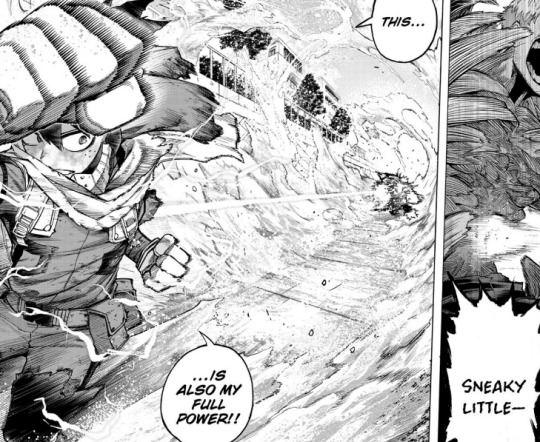
Well, if he’s failed in his goal of understanding a villain then does the story call him out on his failure? Does Deku face any sort of narrative consequence for that failure? Is he framed negatively for failing to understand Muscle, the same way that Judai is framed for abandoning Yubel? Nope. Deku doesn’t express any frustration at all over is inability to reason with Muscle. There’s also no negative consequence for Deku just choosing to punch muscle, it turns out that there was no reasoning with Muscle and some people are just bad eggs so Deku was right. It’s okay for characters to fail, but if a character fails and it’s not framed by the story as a failure then the writing itself as failed. Why even bother to include this scene in the first place if it doesn’t advance Deku’s character in any way? This scene in spite of showing Deku failing to understand someone actively paints Deku in a positive light, because of how much stronger he is ow that he can OHKO a guy that gave him trouble all the way back in the camp arc.
This scene doesn’t tell anything about Deku as a character, it just makes him look cool. In fact that’s precisely the problem, Deku isn’t adequately challenged as a character, because he’s never allowed to fail. Even when he does obviously fail at the things the narrative set out for him to do, he’s never challenged on those failures, because the priority isn’t to make Deku grow, it’s to make Deku look good. As I said before, Judai is the hero because he’s the weakest. Deku is the hero because he’s the strongest. Well, next a big flaw on Deku’s part is that he worshippd the same heroes that were making the world corrupt. Heroes like Endeavor who created people like Dabi. So, does Deku take action to either criticize the older generation of heroes, or separate himself from them in order to try to be better than them? Nope, he teams up with them. Not only that, Deku can’t do something as simple as tell Gran Torino out loud about his plans to save Shigaraki. If Deku feels that Shigaraki is worthy of salvation then he should at least try to make an argument here about his ideal of saving others.
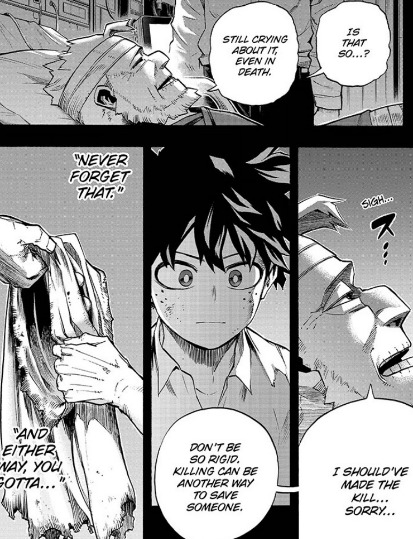
Now here’s the thing, if Deku hadn’t directly looked at the camera and told us he wanted to save Shgiaraki, would we be able to deduce his intentions from his actions? If you took away all of Deku’s internal monologue, and just showed him punching Muscular and saying nothing when Gran Torino says he may have no choice but to kill Shigaraki would anything about Deku’s actions indicate that he wants to save Shigaraki? Let me use avatar the last airbender as a positive example for a moment. People say that Aang’s desire to spare Ozai’s life comes out of left field, but like if you analyze Aang as a character down to their bending, and the way they react in situations they always prefer de-escalation, or taking a third option as opposed to confronting things head on. It’s literally why Toph says Aang has trouble learning earth bending, because as an airbender, he always tries to look for some other way to solve the problem, instead of a direct confrontation with force. As early as season one, Aang tells Zuko someone who has tried to kill him several times that he was friends with someone from the fire nation one hundred years ago and in a different situation they could be friends. Aang’s desire to save the Firelord may not have been told to us until the last possible minute, but Aang’s aversion to violence has always been a part of his character from the beginning. However, Deku never shows any similar aversion to violence. There’s basically no example where he ever tries to de-escalate a situation, or he avoids a conflict by seeking a third option.
Anyway, let’s move onto the next example. In the confrontation where Lady Nagant fights Deku, when Deku learns the fact that the heroes were employing government hitmen to attack people for uhh… exercising free speech does Deku give any reaction to this information? When Lady Nagant says that Deku is only going to bring back the status quo, does he show her any meaningful evidence that he won’t do that.
Deku’s response is because the world is so grey, he needs to extend a helping hand to others. Which you know what thay could be a response. Deku saying that his response to the corruption of the hero world is that he now understands that society led some people down the wrong path, so his way of addressing the wrongs of that society is lending a helping hand to as many people as possible even people he used to think was irredeemable.
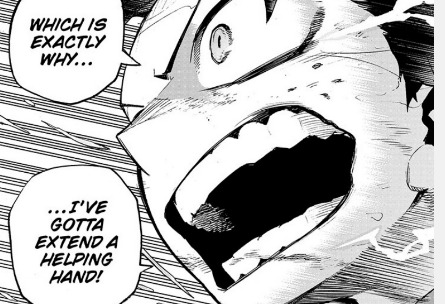
I will give Deku the benefit of the doubt, I think this is an acceptable answer. I can’t save everyone, but that’s not going to stop me from trying to save as many people as possible and maybe I can save people who were this society’s victims on the way too. However, does Deku demonstrate his resolve to extend a helping hand in any meaningful way.
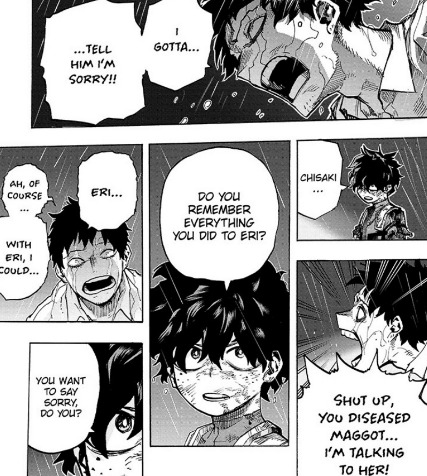
Deku is met with an armless, insane Overhaul who’s begging for someone to help heal his father figure in the Yakuza from his coma. This isn’t like Muscular who insists that there’s no helping him, Deku is met face by face with someone asking him for help. Deku’s gotta extend a helping arm whenever he can, because he knows some people were abandoned and led astray by this society… Unless that person is someone he doesn’t like personally. At which point he only helps them on a conditional basis. We are told Deku will save anyone and everyone, but Deku is met face to face with an armless man who is begging for help and Deku’s does nothing to help him. Deku’s not criticized for refusing to help overhaul either, it’s never brought up again. When Deku begins to experience a mental breakdown because of all the people he’s trying to help in the Dark Deku arc, we are told this is the result of Deku trying to save everyone, but we do not see Deku attempting to save a single villain after Muscular and Nagant.
He exhausts himself beating up villains that AFO sends after him, and only helping innocent civilians. Which would be fine if this arc were about how Deku is running away from his real responsibilities the same way that Judai was running, but that’s not what we’re being told. We are told that this is all part of an arc of Deku learning to understand villains and be a hero.
Deku is asked “Can you save Shigaraki?” by the story, but Deku never at any point has to deliberate on that question. Judai doesn’t deliberate on that question either, but him choosing not to think about things and stay ignorant is the point.
It’s actually fine to make Deku stagnate as a character. It’s fine to have him take the easy way out by just punching villains and giving up on them after one conversation. It’s fine for him to be empathetic to other people’s suffering, or even self-righteous. It’s fine for him to be ignorant.
He could be all of those things if it was a part of a narrative teaching him to unlearn his behavior. In fact the narrative might have been better if Deku started out by saying he didn’t want to save Shigaraki, that there was no choice but to kill him, because then at least his actions would be consistent with his words. Then his lack of empathy and his tendency to resort to violently beating up villains instead of avoiding violence would be character flaws he could work on. Deku however, is presented to us as this empathic hero who is always willing to give others a second chance though he never actually sticks his neck out in order to do so. Continuing on with our slow crawl through MHA, one of Deku’s friends is revealed as the traitor. Deku has a heartwarming scene fo saying that Aoyama can still be a hero, but look at his actions. He lets the adults in the room physically tie Aoyama in a straightjacket and imprison him, for the crime of… doing bad things while he was in a hostage situation. Apparently, if a bank teller helps the bank robber by giving them money when the robber has a gun to his head, the swat team should just snipe the bank teller. Not only does he not defend Aoyama against the adults, or stand up for him, or tell the adults they’re wrong to treat Aoyama a clear cut victim who had a gun to his head and was bing held hostage like he’s a villain - he also lets the adults use Aoyama an innocent victim as bait in order to lure out AFO. Deku tells Aoyama he can still be a hero, but he doesn’t defend Aoyama as a victim of being taken hostage, nor does he stop the adults from further taking advantage of him and throwing him right into danger. Some people are just led the wrong way that’s why they need to be extended a helping hand, but fuck Aoyama I guess. He needs to earn the right to be sympathized with by physically putting his life in danger.
Deku can’t even go out of his way to save a friend who he’s known for the better part of a year, when that friend is a complex victim forced to do bad things.
Then Deku and Uraraka have a conversation where they both, kind of ruminate on the idea that maybe the villains are human beings who are worthy of sympathy.
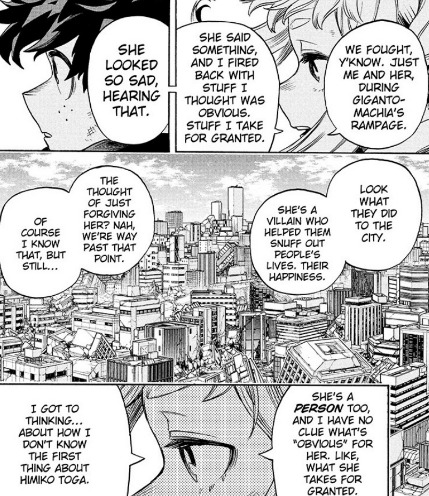
In fact Uraraka is actively trying to dehumanize Toga by looking at the destroyed city, so she won't have to think of Togaas a person.
The language here is also a major fault of this arc. It focuses far too hard on “forgiveness” over and over again. As I said before, saving Shigaraki isn’t about Shigaraki at all, it’s about Deku, and how he wants to use his power as a hero. Deku has even stated himself that he doesn’t believe that OFA is a power that should be used for killing people. So why does whether Toga or Shigaraki are forgivable or not even matter? It’s the same with Deku refusing Overhaul any sympathy. If he’s so morally opposed to abusers, then why does he work with Endeavor and defend him at every visible opportunity, even in front of his victims? Whether or not Deku can forgive Shigaraki doesn’t matter, because Deku is not the moral arbitrator or right and wrong. In fact Deku doesn’t even have any morals, so how is this a moral debate? Is there any point where Deku gives a clear definition of what he thinks right and wrong is? Does he quot Immanuel Kant to the audience?
Batman doesn’t kill people, not because he thinks that every last person on earth can be saved, but because Bruce Wayne an incredibly rich white man thinks that maybe he shouldn’t have the authority to decide who lives and who dies. When Bruce doesn’t kill the joker, it doesn’t mean he thinks the Jokers actions are forgivable, it’s because Bruce thinks it’s not his place to determine whether someone has the right to live.
The whole conflict that MHA presents us is that heroes pick and choose who to save, and only save the ones they deem as innocent. So, how does Deku saying repeatedly they can’t forgive Shigaraki contribute to that theme in any way? In fact by focusing on forgiveness, rather than whether or not he personally has the right to pick and choose who lives and who dies Deku is ignoring the elephant in the room. The question isn’t about whether Shigaraki’s redeemable or if his deeds should ever be forgiven. The question is whether Deku has the right to decide who gets saved and who doesn’t.
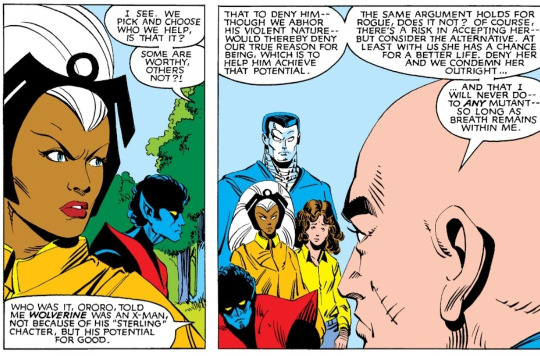
We are told that Deku as a character is someone who wants to save everyone no matter what, so Deku shouldn’t be focusing on whether or not Shigaraki is worthy of forgiveness, he should be making an idealistic argument like Xavier does in this panel. Why doesn’t Deku talk out loud with Uraraka on how he believes his power is for saving others, and not killing? If he’s meant to represent some idealistic hero, then why doesn’t he even talk about his ideals? Why don’t I as the reader know what those ideals are?
I think Xavier’s ideals of forcing the X-men to provide a good example to the mutant community, in order to try to earn the respect of other human beings is wrong, but at least he has ideals. He tries to inspire the other people around him to live up to those ideals. The story can criticize him for his ideals and point out how they’re wrong, while it can also uplift parts of his idelogy like where he believes there are no evil mutants. Deku has a chance to do the same to Uraraka, to tell her clearly, “I don’t think we as heroes have the right to pick and choose who we help…?” but he waffles. Not only does he waffle, but this moment is meant to be read as an indication that both Deku and Uraraka are sympathetic individuals who want to save their villains. They are supposed to look good and idealistic here and they don’t. For Deku it just seems like a repeat of his behavior with Overhaul. The only villains that are worthy of sympathy, are the ones that he personally decides are forgivable.
The story isn’t about whether or not it’s moral to save someone who’s killed as many as Shigaraki has. The story never seriously discusses any sort of complex morality or moral philosophy. Once again to bring up avatar, yes you can argue Aang sparing the life of a war crimminal is bad, but Aang mentions on multiple occasions that he wants to retain the cultural values of the airbending people. Aang has a morality, a consistent morality, it might not be a morality you personally agree with but at least he has one. Deku hates abusers, unless he’s next to Endeavor then he thinks abusers should be given the chance to atone. Deku doesn’t believe that One for All is a power for killing, but he never stands up to any of the adults who are blatantly trying to kill Shigaraki, he doesn’t even express out loud to Uraraka that he doesn’t think heroes have the right to decide who lives and who dies. In fact he’s given the perfect opportunity to, when Hawks kills a villain and it’s broadcast live on the news in font of everyone, but Deku never has anything to say about that. The reason Deku and Uraraka both put such an emphasis on “forgiving” their villains has nothing to do with the story itself. It’s because the author Horikoshi, is afraid that some people will misinterpret his story as saying that he actually thinks that saving a villain like Shigaraki means that he condones mass murder, so he has to have the characters talk about not forgiving Shigaraki.
Judai doesn’t have any consistent morals either, but once again that’s the point and something the story relentlessly calls him out on.
Cobra: Fortune would never smile on a fool like you who fights while prattling on about enjoying duels. Cobra: You are certainly a talented duelist. But you have one fatal flaw. Judai: A fatal flaw? Cobra: Yes, your duels are superficial. Someone who fights with nothing on his shoulders, cannot recover once he loses his enjoyment. What a duelist carries on his shoulders will become the power that supports him when he's up against the wall! Cobra: But you have nothing like that! Those who go through life without anything like that cannot possibly seize victory. Cobra: But I know that nothing I say will resonate with you... because you have nothing to lose but the match. Judai: I... Cobra: Afraid aren't you? Right now, you have nothing to support you.
Judai’s regularly called out for his superficiality. Judai is only a hero because he’s strong and wins fight, he doesn’t feel any responsibility towards other people, and in fact he loathes having to feel responsible for others. Judai isn’t just naive, he deliberately chooses to remain ignorant. Since he’s ignorant of his own faults, he makes awful decisions when it comes time for him to lead, and his friends die because of choices he made. We are told that Deku doesn’t want to remain ignorant, that he wants to understand villains, but Deku’s actual actions are him continuing to ignore society’s ills and the suffering of victims. In fact if you take away Deku’s internal monologue and the narration, Deku’s actions almost exactly mirror Judai’s.
Deku is just as superficial as Judai, and he also doesn't want to spend any time thinking about what kind of hero he wants to be, but the narrative never punishes him for it.
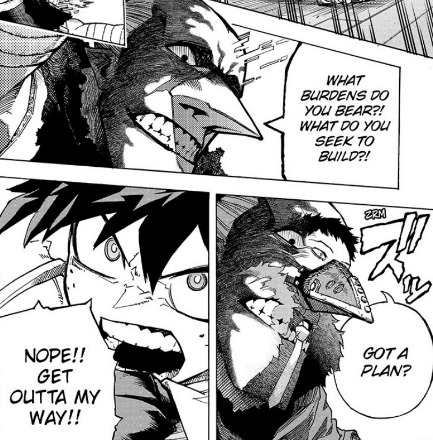
Judai is asked what burdens he has to bear and he has to meaningfull answer that question, Deku is allowed to get away with not having to think about anything. Deku remains superficial. Both Judai and Deku spend the entire arc running away from their villain rather than confronting them in any meaningful way. They both never express out loud any sympathy for their villain, or try to empathize. THey both never step down from the role of hero, and only confront their villain as a hero, because they don’t want to think about themselves as complicit or in the wrong. Shigaraki and Deku’s final confrontation mirrors Judai and Yubel’s but without the same clear framing. THe entire time Yubel is trying to get Judai to empathize with them, and Judai only responds with physical violence, because they don’t want to stop being the hero and because they can’t see Yubel as anything other than the villain. As soon as Deku arrives on the battlefield (by the way everyone else and their mom pointed this out, but Deku who doesn’t think OFA is a power for killing, is completely okay with a plan called the “Sky coffin plan” where every other hero was clearly trying to murder Shigaraki).
When Deku arrives he asks if Shigaraki is still in there, but he doesn’t do anything to try to reach Shigaraki, he jumps right to punching him. In fact he never tries anything besides punching him as hard as possible. How is punching Shigaraki with the force of a thousand suns saving him exactly? How is that different from how he tried to defeat Shigaraki the last war arc, before he saw the image of the crying child that made him want to try a different approach in saving Shigaraki? In Judai’s final fight with Yubel, it’s made explicitly clear that Judai is not trying to save Yubel, and that’s a fault on his part. In fact Judai gives the traditional “I have friends, and you don’t” speech to Yubel but it’s a subversion of how that speech is usually used. Usually that speech is used to show that the protagonist won because of they valued friendship,while the villain treated their friends poorly and only cared about power. However, it’s ironic in this case because Judai got all of his friends killed. Judai treats his friends like garbage. This speech isn’t used to show that Judai is winning because he values his friends more than Yubel does, it shows that Judai is a hypocrite, playing the hero in this situation where they are just as bad as Yubel. Judai’s not morally superior, he’s just lucky that he has good friends. Friends that were willing to save him. The only connection Yubel has to anyone else, Yubel’s only friend is Judai and Judai is a shit friend.
In fact, Mirio tries to give a version of the “You don’t have any friends” speech to Shigarkai, only for Shigaraki to get mad and tell Mirio that he does have friends and people he wants to protect.
This fact is also something that is blatantly ignored by Deku, even though Mirio tells him about it… even though we are told that Deku is trying his best to see the humanity in Shigaraki.
Judai blatantly admits they’re trying to kill Yubel. Which makes them a worse person, but a better character than Deku, because their actions are clearly framed by the narrative and consistent.
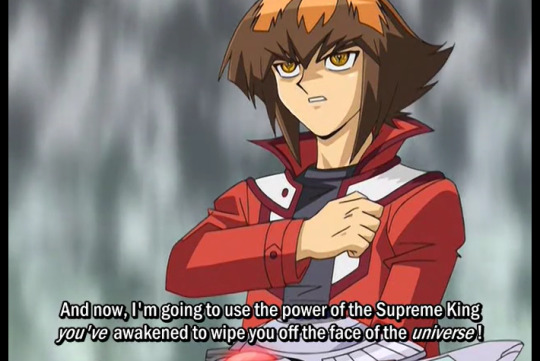
On the other hand we are told that Deku doesn’t want to kill Shigaraki, and yet everything Deku does makes it look like he’s just trying to kill Shigaraki and put him out of its misery. If we didn’t have Deku stating out loud that he wants to save Shigaraki and wants to see him as a human, there’d be nothing in his actions to indicate that he’s trying to avoid killing Shigaraki. Deku says he can’t pretend he didn’t see Shigaraki crying, but like, does he ever hesitate to punch Shigaraki, does he ever think that causing Shigaraki more harm is wrong when he’s already suffered so much? Deku says that Shigaraki is a person but does he treat him like a person? Does he try to talk to him like a person? To use avatar again, Aang does talk to Zuko pretty early on. Deku doesn’t even give the classic “We could have been friends under different circumstances” speech. When Shigaraki resists Deku’s attempts to see him as a person or emapthize with him, Deku’s response is to just resort to punching harder.
Which is in effect the same thing Judai does to Yubel, just kill them as a villain so they don’t hurt anybody else, but framed in an entirely different light. Judai is shown to be ruthless, and cold in his attempt to only settle the conflict with Yubel by violently putting them down. On the other hand we’re being told that Deku is compassionate and empathic while he punches Shigaraki with the force of a thousand suns.
There’s another eerie similarity between both of these final confrontations. At the climax of the confrontation, both Judai and Deku have a psychic vision where they see events from Yubel and Shigaraki’s childhood. This vision is supposed to help both characters understand the good in the villain they’re facing.
Let’s see the contents of this vision and how the visions change each character. Judai is shown a vision of his past life where Yubel sacrifices their entire body, and even their humanity to go through painful surgery to turn into an ugly dragon, all for the sake of protecting Judai in a previous life.
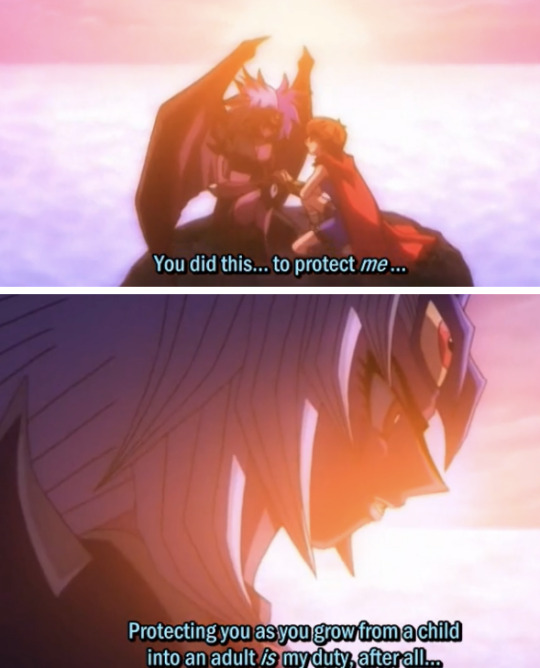
Judai is then forced to witness the good side of Yubel they’ve been ignoring all along to paint them as a villain. Yubel is simultaneously extremely selfish and willing to hurt people Judai cares about, but they’re also extremely selfless and will do anything to protect Judai and have made great sacrifices in the past for Judai’s sake. Deku gives lip service to not ignoring the humanity in Shigaraki, but Judai is literally forced to acknowledge the humanity in Yubel. Not only that, but Judai changes his behavior immediately after learning this new information. After seing the sacrifice that Yubel made for him in the past, Judai responds with a sacrifice of his own. A sacrifice that perfectly mirrors the sacrifice that Yubel once made for him. Yubel gave up their humanity for Judai, so Judai fuses his spirit to Yubel’s, becoming a human / spirit hybrid so Yubel no longer has to be alone.
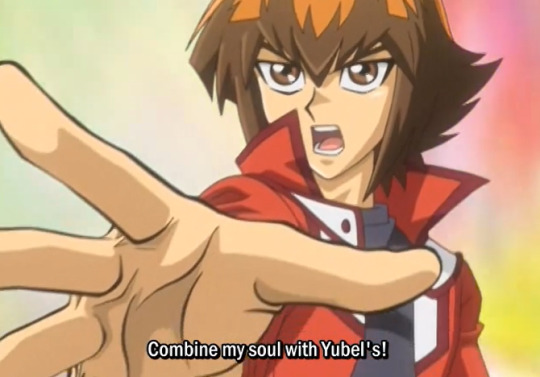
Judai also doesn’t just fuse their soul with Yubel’s in order to stop Yubel from destroying everything, it’s because both of them at this point need to atone together, and Judai is fulfilling his responsibility of watching over his friend until the end to prove that you care about them - as he said to Sho. Judai’s also fulfilling Johan’s dream of helping repair the bonds between spirits and humans, by reconciling with Yubel and repairing their bond. It’s also Judai atoning for his previous behavior of abandoning Yubel, by choosing to stay alongside them as they both atone together. Deku does sacrifice OFA during the fight against Shigaraki, but their sacrifice isn’t to help Shigaraki, but rather doing psychic damage to Shigaraki by using OFA is the only way to defeat them. He transfers OFA in order to break Shigaraki’s brain so he’ll stop reissting and Deku can beat him down. Judai fuses their soul together with Yubel out of empathy and a responsibility they feel to help their friend fater abandoning them, Deku transfers One for All to Shigaraki in order to hurt him and make him easier to punch. It's funny that Deku doesn't travel to Shigaraki's mind to learn more about him, but instead with the specific intent of harming him.
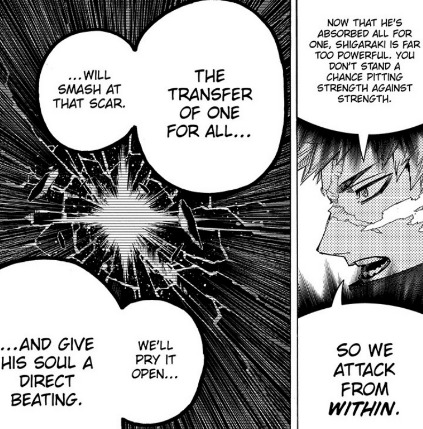
Once he's inside Shigaraki's mind, he doesn't take time to reflect on how Shigaraki used to stand up for bullied kids, or how he wants to be a hero to villains because no one else will stick up for the outcasts in society. No, he only care about Shigaraki when he takes the form of a child crying for help.
In the aftermath of the psychic vision Deku’s behavior doesn’t change towards Shigaraki in any way either. You could say he sacrificed his own arms in order to try to comfort Shigaraki within the depths of his own mind - but that’s not a real sacrifice either because his arms immediately come back. When Judai learns about the sacrifice that Yubel made in a previous life towards him, he stops seeing Yubel as an enemy and finds a way to resolve things peacefully between them. When Deku lanterns that Shigaraki’s a victim of All for One, and that his entire life was a lie, when he sees Shigaraki’s suffering first hand does his beavior twoards Shigaraki change in any way?
When he sees Afo has taken over Shigaraki’s body again, does he try to shout for Shigaraki, to tell Shigaraki to fight from the inside, to reassure Shigaraki that he’s still in there that there’s still good in him? Nope. He just punches Shigaraki some more.
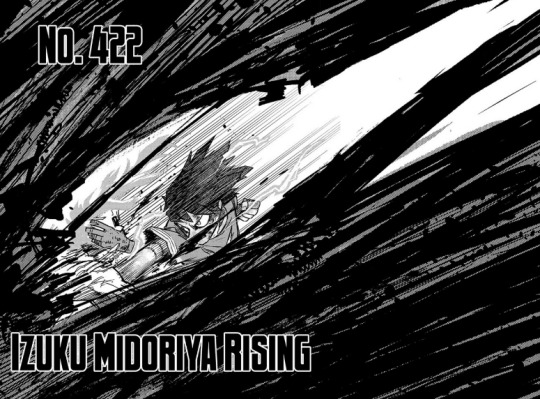
What Deku needed to tell Shigaraki is so obviously set up by the narrative too. Shigaraki wanted just one person in that house to tell him he could be a hero. Deku wanted his mother to tell him he could be a hero if he was quirkless. Deku sees that Shigaraki started out as a boy who wanted to be a hero, and who was manipulated into being a villain but does he try to appeal to the boy inside of Shigaraki by telling him he can still be a hero? Does he now see the good in Shigaraki? Nope, he just tries to kill him by punching him really hard.
I purposefully chose the images for the banner of this post, because it shows how differently MHA and GX treated its villains in the end. Yubel is embraced by Judai in the end, Shigaraki evaporates into dust.
"Judai, now that our souls have become one we will never be separated again. I have now been filled with your love and power. Let us fight together, against the wave of light leading this universe to destruction!"
Shigaraki could so easily have been given the love and empathy that Yubel was shown, but instead their life ends with no show of empathy from Deku, and with them dying believing that their long life of tragedy meant nothing in the end. Shigaraki realizes he's a crying kid, but he's never comforted.
Shigaraki: I only stole my body back from Master, and I didn't destroy anything. "In the end, I was just as you said... A crying kid, huh?"
Yubel is embraced and comforted, Shigaraki disintegrates into nothing.
One of these stories is apparently an optimistic story about heroes saving people, but it ends with the lifelong victim being killed in the most nihilistic manner possible, never receiving comfort, and never achieving anything with his long life.
The other story is a silly anime about card games, shows that when people are alone and suffering they can lash out and do terrible things. That all people are weak especially when they're alone, but the solution isn't to abandon them, or condemn them for their faults, but to believe in them and help uplift them the same way that Judai decides to uplift Yubel so they can atone together.
Which is why Deku gets an F in being a hero. Go directly to summer school. Do not pass Go. Do not collect $100.
#mha meta#ygo meta#mha 423#bnha 423#mha 423 spoilers#bnha 423 spoilers#izuku midoriya#deku#shigaraki tomura#tenko shimura#judai yuki#yubel#soulshipping#yu gi oh gx#yu gi oh
753 notes
·
View notes